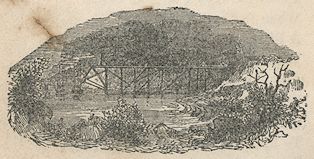What to Do and How to Do It; or, Morals and Manners Taught By Examples, by Samuel Griswold Goodrich. (New York: Wiley & Putnam, 1844)
front cover and spine: Peter Parley—dressed in his trademark “small clothes”—talks to children; his gouty foot rests on a footstool
-----
[title page, Hemingway copy]
[title page, 1856 copy]
AND
HOW TO DO IT;
OR,
MORALS AND MANNERS
TAUGHT BY
EXAMPLES.
BY
PETER PARLEY.
NEW YORK:
WILEY & PUTNAM.
1844.
-----
[copyright]
Entered, according to Act of Congress, in the year 1843,
By S. G. GOODRICH,
in the Clerk’s Office of the District Court of the United States,
for the District of Massachusetts.
-----
[p. iii]
CONTENTS.
PAGE
Chap. I. Everything is made to be Happy … 1
Chap. II. Do as you would be done unto … 6
Chap. III. Truth … 8
Chap. IV. The Choice, or Good and Evil … 16
Chap. V. What Kind of Heart have you got? … 22
Chap. VI. What Kind of Heart have you got? … 31
Chap. VII. Charity … 34
Chap. VIII. Charity … 41
Chap. IX. Charity … 48
Chap. X. Charity … 51
Chap. XI. Selfishness … 57
Chap. XII. The Value of Character … 59
Chap. XIII. Justice … 61
Chap. XIV. Humility … 63
Chap. XV. Mildness … 65
Chap. XVI. Candour … 67
Chap. XVII. Prejudice … 70
-----
p. iv
PAGE
Chap. XVIII. Mercy … 84
Chap. XIX. Courage … 87
Chap. XX. Patience and Impatience … 89
Chap. XXI. Cheerfulness and Gloom … 92
Chap. XXII. Good Habits and Good Manners taught by Example … 95
Chap. XXIII. Obedience … 108
Chap. XXIV. How to settle a Dispute …114
Chap. XXV. Politeness … 120
Chap. XXVI. Boasting … 133
Chap. XXVII. Weakness of Character … 136
Chap. XXVIII. Self-reliance—Perseverance … 142
Chap. XXIX. Gratitude … 150
Chap. XXX. Amusement … 153
Chap. XXXI. Do not be too positive … 156
Chap. XXXII. Attention … 160
Chap. XXXIII. Vanity … 165
Chap. XXXIV. Do not be discouraged by Difficulties … 169
-----
[p. 1]
WHAT TO DO,
AND HOW TO DO IT.
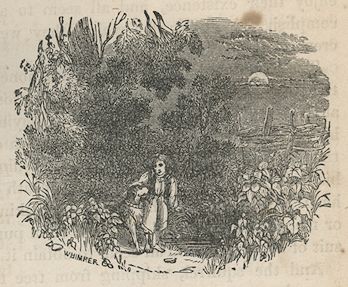
CHAPTER I.
EVERYTHING IS MADE TO BE HAPPY
If any one of my young friends will get up early in the morning and go forth among the birds, the insects, the four-footed beasts, he will see that they all seem made to be happy.
-----
p. 2
The robin in singing its song, the sparrow in building its nest, the swallow in pursuing its insect prey, the doves in their fond intercourse with each other, the busy crow in feeding its young—all seem made to enjoy their existence, and all seem to accomplish the design for which they were created.
The busy bee in storing away its honey, the bustling ants in carrying on the various affairs of the hill, the grasshopper in playing his little fiddle, the butterfly in his search of the sweetest flower, even the beetle in rolling his ball, the cricket in chirping beneath a heap of stones, and the spider in making or mending his net—all appear to be in pursuit of happiness, and all seem to obtain it.
And the squirrel, skipping from tree to tree, the mouse in gnawing a hole to get at the meal, the frog in the brook, the toad in his burrow of earth, the wild deer in the forest, the sheep upon the grassy hill side, the cows in the meadow, the dog at his master’s side—these all declare that they are in pursuit of enjoyment, and that they find what they seek.
-----
p. 3
Happiness, then, is the end and object for which these creatures were made: and they all, taken in a general view, attain it. Life to them is a blessing. It was given them by a good and loving Creator, who meant that they should enjoy it.
And were not human beings made for happiness too? Yes—and for even greater happiness than these birds, and insects, and quadrupeds. We are made not only to enjoy the pleasures of animal life, but those of the heart and of the mind: we are not only made to eat and drink, and perceive heat and cold, but to feel the beauty of virtue, and the grace of goodness; to enter the fields of knowledge, and enjoy the boundless pleasures of thought.
The Creator, then, intended us for happiness, but in giving us nobler endowments than those of mere animals, he has bestowed upon us liberty, or the power to act as we please. Here, then, he made a great difference between us and the beasts: he laid them under the laws of instinct: he placed in each of them certain wonderful aptitudes, habits, and powers, which govern and control them. Thus, obeying these laws, they
-----
p. 4
fulfil the designs of God, and attain the end of their existence. Man has good and evil placed before him, and he may choose which he pleases: it is God’s will that man should choose the good, and thus be happy: but still, having made us free, he leaves us to choose evil and suffer sorrow, if we will.
While God, therefore, guides the birds and fishes and insects and four-footed beasts, by their instincts, to happiness, He has left us to our own choice. It is for us to decide whether we will be happy or not. God has given us reason in the place of instinct, and if we will obey that reason wisely, and follow the paths which it points out, happiness is ours, not only for this world, but for that which is to come.
Now we do not send animals to school, and give them books, for God is their teacher: their instincts are all they need. But human beings are to be educated, instructed, and by a gradual progress, elevated to that high destiny for which they are qualified. Instruction is the means by which we are to be taught our duty, and by which we may accomplish the end for which we were created.
-----
p. 5
But instruction will not make us happy, unless we listen to it, and obey its teachings. We must not only know what is good and right, but we must pursue and do what is good and right.
We all desire to be happy: no one can by any possibility desire to be miserable. And how can we be happy? The answer is easy, to do good, and to do it in the right way. We must not only take care to have our hearts right, but our manners must be right: we must not only be honest, true, charitable, virtuous, but we must be amiable, kind, cheerful, agreeable. We must not make it our sole object to be happy ourselves, but we must constantly try to make others happy also. And how can we make others happy, if our manners, our looks, our words, our mode of speaking, are disagreeable?
Now proceeding upon the certainty that all my young friends desire to be happy, I write this book, to assist them in becoming so. I intend it to be a pleasant book, full of truth, but full of amusement also. My purpose is to teach young people the great art of life—that of doing right in the right way: that of being not only good, but agreeable.
-----
p. 6
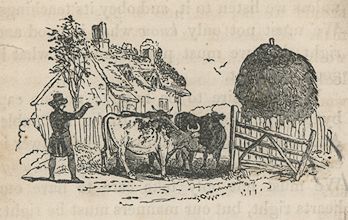
CHAPTER II.
DO AS YOU WOULD BE DONE UNTO.
This sentence contains the substance of the moral law, that law which points out our duty to our fellow-men. Now what do we wish of our fellow-men—how do we desire that others should treat us? We wish them to treat us kindly, justly, charitably: we wish them to be polite, affectionate, cheerful, pleasant.
Let us then be kind, just, charitable, polite, affectionate, cheerful, pleasant to others. If all would observe this beautiful rule, which Christ himself has given us, how happy
-----
p. 7
should we be, and how happy should we make all around us! What a delightful world this would become, if every one would look about and do to his neighbour, as he would wish his neighbour to do to him!
To show how pleasantly this rule would work, let me tell you a story,—a true one:
The horse of a pious man happening to stray into the road, his heighbour put him into the pound. Meeting the owner soon after, he told him what he had done; “and if I catch him in the road again,” said he, “I will do it again.”
“Neighbour,” replied the other, “not long since I looked out of my window in the night, and saw your cattle in my headow, and I drove them out and shut them into your yard, and I will do it again.” Struck with the reply, the man liberated the horse from the pound, and paid the charges himself.
And let me tell my little readers, if they wish their playmates and companions to be kind to them, they can best secure their object by being kind themselves. Kindness begets kindness; doing good to others is the best way of doing good to ourselves.
-----
[p. 8]
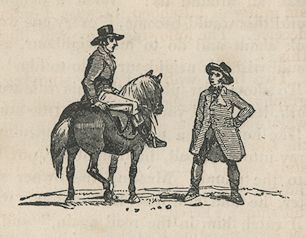
CHAPTER III.
TRUTH.
Truth is conformity to fact, in a statement or representation. If I say that London is the largest city in the world, my statement conforms to fact, and is therefore true. If I say that Boston has more inhabitants than New York, my statement does not conform to fact, and therefore is not true.
There is one thing more to be considered, which is, that the statement must conform to fact in the sense in which it is meant to be understood. If I say a thing which is lite-
-----
p. 9
rally true, but which is not true in the sense in which I mean it to be understood, then I am guilty of falsehood, because I intend to deceive. The following story will illustrate this:
Two boys, who had been studying geography, were walking together one evening, when one of them exclaimed, “How brightly the sun shines!” The other boy immediately replied that, as it was evening, the sun did not shine. The first boy insisted that it did shine; whereupon a dispute arose, one of the boys insisting that the sun did shine, the other that it did not. At last, they agreed to leave the point to their father, and accordingly they went to him and stated the case. They both agreed that it was nine o’clock at night; that the stars were glittering in the sky; that the sun had been down for nearly two hours; and yet John, the elder of the boys, maintained that, at that moment, the sun was shining as brightly as at noon-day.
When the father demanded an explanation, John said that the geography he had just been studying, stated that when it was
-----
p. 10
night here, it was day in china—“and now,” said he, “of course the sun is shining there, though it is night here. I said that the sun shines, and so it does.”
To this the father replied as follows:
“What you say now, John, is true, but still, what you said to James was a falsehood. You knew that he understood you to say that the sun shone here—you meant that he should so understand you; you meant to convey a statement to his mind that did not conform to fact, and which was therefore untrue. You had a reservation in your own mind, which you withheld from James. You did not say to him that yoou restricted your statement to China—that was no part of your assertion.
“Truth requires us not only to watch over our words, but the ideas we communicate. If we intentionally communicate ideas which are false, then we are guilty of falsehood. Now you said to James that which was untrue, according to the sense in which you knew he would, and in which you intended he should, receive it, and therefore you meant to violate the truth. I must accord-
-----
p. 11
ingly decide against you, and in favour of James; you were wrong, and James is right. The sun did not shine as you said it did, and as James understood you to say it did.”
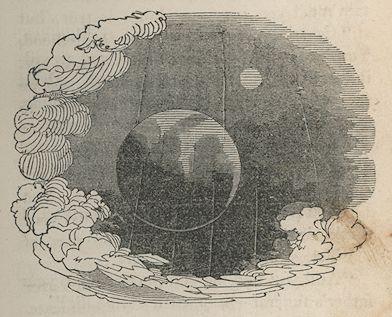
There are many other cases which illustrate this “truth to the letter and lie to the sense.” Some years since, when the laws against travelling on the Sabbath were in force, a man was riding on horseback near Worcester, in Massachusetts. It was on a Sunday morning, and the traveller was soon
-----
p. 12
stopped by a tythingman,* who demanded his reason for riding on the Lord’s day, and thus violating the law.
“My father lies dead in Sutton,” said the other, “and I hope you will not detain me.”
“Certainly not,” said the tythingman, “under these circumstances;” and accordingly he allowed the man to proceed. About two days after, the traveller was returning, and happened to meet the tythingman in the road. The two persons recognized each other, and the following conversation ensued:
“You passed here on Sunday morning, I think, sir,” said the tythingman.
“Yes, sir,” said the traveller.
“And you told me you were going to your father’s funeral—pray when did he die?”
“I did not say I was going to my father’s funeral—I said he lay dead in Sutton, and so he did; but he has been dead for fifteen years.”
*The word tythingman, in New England, is the title of a town officer, who sees to the observance of certain laws relating to the due observance of the Sabbath.
-----
p. 13
Thus you perceive that while the words of the traveller were literally true, they conveyed an intentional falsehood to the tythingman, and therefore the traveller was guilty of deception. I know that people sometimes think these tricks very witty, but they are very wicked. Truth would be of no value if it might be used for the purposes of deception; it is because truth forbids all deception, and requires open dealing, that it is so much prized.
It is always a poor bargain to give away truth for the sake of a momentary advantage or for the purpose of playing off an ingenious trick. To barter truth for fun or mischief is giving away gold for dross. Every time a person tells a lie, or practises a deception, he inflicts an injury upon his mind, perhaps not visible to the eye of man, but as plain to the eye of God as a scar upon the flesh. By repeated falsehoods, a person may scar over his whole soul, so as to make it offensive in the sight of that Being whose love and favour we should seek, for his friendship is the greatest of all blessings.
Truth is the great thing to be sought, and
-----
p. 14
falsehood the chief thing to be avoided. Truth is the foundation of most other virtues—of honesty, justice, and fidelity. No character is so much prized as that of a lover of truth, none so much despised as the liar and the deceiver, for falsehood lies at the bottom of almost every vice.
The Horse and his Groom.
A groom, whose business it was to take care of a certain horse, let the animal go loose into the field. After a while, he wanted to catch him, but the brute chose to run about at liberty, rather than be shut up in the stable; so he prance about the field and kept out of the groom’s way.
The groom now went to the granary, and got the measure with which he was wont to bring the horse his oats. When the horse saw the measure, he thought to be sure that the groom had some oats for him; and so he went up to him, and was instantly caught and taken to the stable.
Another day, the horse was in the field, and refused to be caught. So the groom
-----
p. 15
again got the measure, and held it out, inviting the horse, as before, to come up to him. But the animal shook his head, saying, “Nay, master groom; you told me a lie the other day, and I am not so silly as to be cheated a second time by you.”
“But,” said the groom, “I did not tell you a lie; I only held out the measure, and you fancied that it was full of oats. I did not tell you there were oats in it.”
“Your excuse is worse than the cheat itself,” said the horse. “You held out the measure, and thereby did as much as to say, “I have got some oats for you.’ ”
Actions speak as well as words. Every deceiver, whether by words or deeds, is a liar; and nobody, that has been once deceived by him, will fail to shun and despise him ever after.
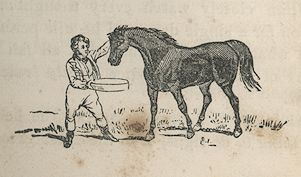
-----
p. 16
CHAPTER IV.
THE CHOICE, OR GOOD AND EVIL.
There are few persons who do precisely as they ought to do. It is very seldom that any one, even for a single day, discharges every duty that rests upon him, at the same time avoiding everything that is wrong. There is usually something neglected, delayed, or postponed, that ought to be done to-day. There is usually some thought entertained, some feeling indulged, some deed committed, that is sinful. If any person doubts this, let him make the experiment; let him closely watch every thought and action for a single day, and he will perceive that what we say is true—that all fall far short of perfect obedience to the rule of right.
And yet, if a person can once make up his mind to do right, it is the surest way to
-----
p. 17
obtain happiness. I shall endeavour to illustrate this by an allegory:
The Garden of Peace.
In an ancient city of the East, two youths were passing a beautiful garden. It was inclosed by a lofty trellis, which prevented their entering; but, through the openings,
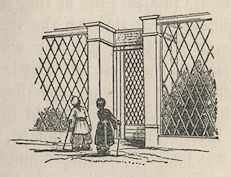
they could perceive that it was a most enchanting spot. It was embellished by every object of nature and art that could give beauty to the landscape. There were groves of lofty trees, with winding avenues between them: there were green lawns, the grass of which seemed like velvet: there were groups of shrubs, many of them in bloom, and scattering delicious fragrance upon the atmosphere.
-----
p. 18
Between these pleasing objects there were fountains sending their silvery showers into the air; and a stream of water, clear as crystal, wound with gentle murmurs through the place. The charms of this lovely scene were greatly heightened by the delicious music of birds, the hum of bees, and the echoes of many youthful and happy voices.
The two young men gazed upon the scene with intense interest; but as they could only see a portion of it through the trellis, they looked out for some gate by which they might enter the garden. At a little distance, they perceived a gateway, and they went to the spot, supposing they should find an entrance here. there was, indeed, a gate; but, it was locked, and they found it impossible to gain admittance.
While they were considering what course they should adopt, they perceived an inscription over the gate, which ran as follows:
“Ne’er till to-morrow’s light delay
What may as well be done to-day;
Ne’er do the thing you ’d wish undone,
View’d by to-morrow’s rising sun.
Observe these Rules a single year,
And you may freely enter here.
-----
p. 19
The two youths were much struck by these lines; and, before they parted, both agreed to make the experiment by trying to live according to the inscription.
I need not tell the details of their progress in the trial: both found the task much more difficult than they at first imagined. To their surprise, they found that an observance of the rule they had adopted required an almost total change of their modes of life; and this taught them, what they had not felt before, that a very large part of their lives—a very large share of their thoughts, feelings and actions—were wrong, though they were considered virtuous young men by the society in which they lived.
After a few weeks, the younger of the two, finding that the scheme put too many restraints upon his tastes, abandoned the trail. The other persevered, and, at the end of the year, presented himself at the gateway of the garden.
To his great joy, he was instantly admitted; and if the place pleased him when seen dimly through the trellis, it appeared far more lovely, now that he could actually tread
-----
p. 20
its pathways, breathe its balmy air, and mingle intimately with the scenes around. One thing delighted, yet surprised him—which was this: it now seemed easy for him to do right; nay, to do right, instead of requiring self-denial and a sacrifice of his tastes and wishes, seemed to him a matter of course, and the pleasantest thing he could do.
While he was thinking of this, a person came near, and the two fell into conversation. After a little while, the youth told his companion what he was thinking of, and asked him to account for his feelings. “This place,” said the other, “is the Grden of Peace. It is the abode of those who have chosen God’s will as the rule of their lives. It is a happy home provided for those who have conquered selfishness; those who have learned to conquer their passions and do their duty. This lovely garden is but a picture of the heart that is firmly established in the ways of virtue. Its ways are ways of pleasantness, and all its paths are peace.”
While they were thus conversing, and as they were passing near the gateway, the youth saw on the other side the friend who
-----
p. 21
had resolved to follow the inscription, but who had given up the trial. Upon this, the companion of the youth said, “Behold the young man who could not conquer himself! How miserable is he in comparison with yourself! What is it makes the difference? you are in the Garden of Peace; he is excluded from it. This tall gateway is a barrier that he cannot pass; this is the barrier, interposed by human vices and human passions, which separates mankind from that peace, of which we are all capable. Whoever can conquer himself, and has resolved firmly that he will do it, has found the kay of that gate, and he may freely enter here. If he cannot do that, he must continue to be an outcast form the Garden of Peace.”
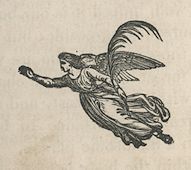
-----
p. 22
CHAPTER V.
WHAT KIND OF HEART HAVE YOU GOT?
Many people seem to think only of their external appearance, of their personal beauty, or their dress. If they have a handsome face, a good figure, and a fine attire, they appear satisfied; nay, more, we often see persons showing vanity and pride merely because they have beautiful garments on, or because they are called pretty or handsome.
Now I am not such a sour old fellow as to despise these things, it is certainly desirable to appear well, indeed it is our bounden duty to make ourselves agreeable; but I have remarked that those persons who are vain of outside show, forget that the real character of a person is within the breast, and that it is of vastly greater importance to have a good heart than a handsome person.
The heart within the body is of flesh, but
-----
p. 23
it is the seat of life: upon its beatings our life depends. Let the heart stop, and death immediately follows. Beside this, the heart is influenced by our feelings. If one is suddenly frightened, it beats more rapidly. Any strong emotion, or passion, or sensation, quickens the action of the heart.
It is for these reasons, because the heart is the seat of life, and because it seems to be the centre or source of our passions and feelings, that we often call the soul itself, the heart. Thus the heart of flesh is a sort of emblem or image of the soul. When I ask, therefore, what sort of heart have you got? I mean to ask what sort of soul have you got?
We often hear it said that such a person has a hard heart, and such a one has a kind or tender heart. In these cases we do not speak of the heart of flesh, but of the mind and intention. A hard heart, in this sense, is a soul that is severe, harsh, and cruel; a kind and tender heart, is a soul that is regardful of the feelings of others, and desirous of promoting the peace and happiness of others.
You will see, therefore, that it is very im-
-----
p. 24
portant for every individual to assure himself that he has a good heart. the reasons why it is important, I will endeavour to place before you.
In the first place, “God looketh on the heart.” He does not regard our dress, or our complexion, or our features. These do not form our character; they have nothing to do with making us good or bad. If God looks into the breast and finds a good heart there, a tender, kind soul, full of love toward Him and all mankind,—a heart that is constantly exercised by feelings of piety and benevolence,—he approves of it, and he loves it.
God does not care what sort of garment covers such a heart, or what complexion or features a person with such a heart has got. He looketh on the heart, and finding that good, he bestows his blessing, which is worth more than all the wealth of this wide world.
Personal appearance is of no value in the sight of God. It is only because men value it, that it is to be regarded. But upon the character of the hear, the favour or displea-
-----
p. 25
sure of God depends. It is of the greatest importance, therefore, for each person to see what kind of heart he has got. If he loves to do mischief; if he loves to say or do harsh and unkind things; if he loves to wound the feelings of others; if he loves to see another suffer; if he wishes, in any way, to injure another in his mind, body, or estate, then he has a bad heart; and God looks on that bad heart as we look upon a malignant and wicked countenance.
Before God, every heart has a character. We cannot see into the bosom, but God can. All things are transparent to Him, and he looketh on the heart as we do upon one another’s faces: and to Him, every heart is as distinctly marked as men’s countenances are to us. A wolf has a severe, harsh, and cruel expression in his countenance. A bad heart has as distinct an expression in the sight of God, as the wolf’s face to human eyes.
The second reason for having a good heart is, that it not only wins the favour of God, but of men. However we may fancy that mankind think only of outside appear-
-----
p. 26
ance, they do in fact think more of internal goodness. Mankind, in all ages and countries, love, respect, and revere the person who has a good heart; the person whose soul is habitually exercised by piety toward God and love toward mankind, is always esteemed and loved in return.
Such a person is almost sure to be happy; even if he is destitute of money, he has that which in this world is of more value, the good will, the sympathy, the kind wishes and kind offices of his fellow-men. If a person wishes success in life, therefore, there is no turnpike road to it like a good heart. A man who seeks to extort, to require, to command the good will of the world, will miss his object. A proud person, who would force men to admire him, is resisted; he is looked upon as a kind of robber, who demands what is not his own, and he is usually as much hated as the person who meets you on a by-road at night, and, holding a pistol in your face, demands your purse.
The proud person, the person who demands your respect, and tries to force you into good will toward him, turns your feel-
-----
p. 27
ings against him; [while?] the gentle, the humble, and the kind-hearted, appeal to the breast with a power we cannot resist. The person, therefore, of real power, is the person with a good heart. He wields a sceptre which men would not resist if they could, and could not if they would.
The third reason for having a good heart is, that while the exercise of a bad heart is painful, the exercise of a good heart is blissful. A heart that indulges in envy, malice, anger, revenge, jealousy, covetousness, becomes unhappy and miserable; a heart that exercises piety, love, charity, candour, peace, kindness, gentleness, becomes happy.
The exercise of piety and good feelings brings pleasure and enjoyment to the soul, as cool, fresh water does to a thirsty lip: bad feelings bring pain and misery to the soul, as bitter and poisoned water does to the palate and the stomach. A person, therefore, who indulges in bad feelings, is as unwise as one who refuses pure water and drinks poison.
The fourth reason for having a good heart is, that it is the surest way to be handsome.
-----
p. 28
A person with a good heart is almost always good-looking; and for this reason, that the soul shines through the countenance. If the heart is angry, the face is a tell-tale, and shows it. If the heart is exercised with piety, the countenance declares it.
Thus the habits of the soul become written on the countenance; what we call the expression of the face is only the story which the face tells about the feelings of the heart. If the heart is habitually exercised by malice, then a malicious expression becomes habitually stamped upon the face. The expression of the countenance is a record which sets forth to the world the habitual feelings, the character of the heart.
I know very well that some persons learn to put a false expression upon their faces: Shakspeare speaks of one who “can smile and smile and be a villain still.” This false veil, designed to hide a bad heart, is, however, generally too thin to answer its purpose. Mankind usually detect the veil of ypocrisy, and as flies see and shun a spider’s web, so mankind generally remark and avoid the hypocrite’s veil. They know
-----
p. 29
that the spider, the dastardly betrayer, is behind it, ready to make dupes and victims of those whom he can deceive.
The only true way, therefore, to have a good face, a truly and permanently handsome face, is to ahve a good heart, and thus have a good expression. There can be no genuine and abiding beauty without it: complexion and features are of little consequence. Those whom the world call handsome, have frequently neither regularity of features nor fairness of complexion. It is that indescribable thing called expression, the pleasant story which the countenance tells of the good heart within, that wins favour.
There are many other good reasons for having a good heart; but I have not room to tell them here. I must say a word, however, as to the means of curing a bad heart and getting a good one.
The first thing is, to find out what a good heart is, and what a bad heart is; and in making this inquiry it will much help you to read carefully the account given of Jesus Christ in the gospels of Matthew, Mark, Luke, and John. There are no pages like
-----
p. 30
these so full of instruction, and that so readily impart their meaning to the soul of the reader.
They give us a portrait of our Saviour,—and what a portrait! How humble, yet how majestic! how mild, yet how dignified! how simple, yet how beautiful! He is represented as full of love toward God, and toward manking; as going about doing good; as having a tender and kind feeling for every human being; as healing the sick, giving sight to the blind, and pouring the music of sound upon the deaf ear. Love to God, which teaches us to love all mankind, evidently filled the heart of Jesus Christ; and his great desire seems to have been, that all mankind should have hearts filled with the same feeling that governed his. A good heart, then, is one like Christ’s; a bad heart is one that is unlike Christ’s. A good heart is one that is habitually exercised by love to God and charity to man; a bad heart is one that is exercised by selfishness, covetousness, anger, revenge, greediness, envy, suspicion, or malice.
-----
p. 31
CHAPTER VI.
WHAT KIND OF HEART HAVE YOU GOT?.
Having learned what is meant by a good and bad heart, the next thing is to look into our own breasts and see what kind of a heart we ourselves have got. This is of first-rate importance, and therefore it is that I ask the question—“What sort of heart have you got, reader?”
Having, by careful examination, found out what sort of a heart you have got, then you are prepared to act with good effect. If you find that you have a good heart, a heart like Christ’s, filled with the love of God and feelings of obedience to God, and with love an charity to all mankind, evinced by a desire to promote the peace and happiness of all; then be thankful for this best of gifts, and pray Heaven that it may continue to be yours. An immortal spirit, with the prin-
-----
p. 32
ciple of goodness in it, is yours—and how great a blessing is that!
But if you discover that you have a bad heart, pray set about curing it as soon as possible. An immortal spirit with a principle of badness in it, is surely a thing to be dreaded; and yet this is your condition, if you have a bad heart. In such a case, repentance is the first step for you to take. Sorrow, sincere sorrow, is the condition upon which past errors are forgiven by God; and this condition must be complied with.
There is no forgiveness without repentance, because there is no amendment without it. Repentance implies aversion to si; and it is because the penitent hates sin, that the record of his offences is blotted out. While he loves sin, all his crimes, all his transgressions must stand written down andd remembered against him, because he says that he likes them,—he vindicates, he approves of them. Oh take good care, kind and gentle reader—take good care to blot out the long account of your errors, before God, speedily! Do not, by still loving sin, say to God that you are willing to have those
-----
p. 33
that you have committed, and those you may commit, brought up in judgment against you. Draw black lines around the record of your transgressions, by repentance.
And having thus begun right, continue to go on right. At first, the task may be difficult. To break-in a bad heart to habits of goodness, is like breaking a wild colt to the saddle or harness; it resists, it rears up, it kicks, it spurns the bit, it seeks to run free and loose, as nature and impulse dictate and as it has been wont to do before: but master it once, and teach it to go in the path, and it will soon be its habit, its pleasure, its easy and chosen way to continue in the path.
To aid you in this process of making a good heart out of a bad one, study the Bible, and especially that which records the life and paints the portrait of Christ. Imitate, humbly, but reverently and devoutly, his example; drink at the fountain at which he drank, the overflowing river of love to God.
This is the way to keep the spark of goodness in the heart; and to cherish this, to keep it bright, exercise yourself in good deeds, in good thoughts, in good feelings.
-----
[p. 34]
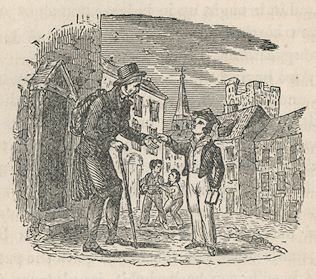
CHAPTER VII.
CHARITY.
Charity is that kindness of heart which makes us desirous of rendering others happy. It is one of the greatest of virtues, and without it, no one can be good. It is a pure love of mankind, and of all things that live, and breathe, and feel. It is a beautiful sentiment, and in the sight of God is of more value than all the gold and silver of the world. It is indeed the pearl of great price:
-----
p. 35
one who has it is rich in the sight of God; one who has it not, is poor indeed, though he may have lands and money in abundance.
The most common form of charity is that of giving alms to the poor: and every one who loves his money so well that he cannot part with a portion of what is not necessary for his own comfort, or that of his family, to aid the needy and the helpless, in the sight of God and true wisdom, is worse than a beggar. Rich in the things of this world, he is pinched with selfishness, which implies a miserable dearth of true riches.
Another form of charity is that of putting kind and favorable constructions upon the conduct of others. A person who is harsh in judging and severe in speaking of others is destitute of charity. I am afraid that some of my young friends, who are apt to say unpleasant things of their companions, are in this condition.
Think a moment of it, my gentle reader;—why should you desire to wound the heart of another—to tear his character to pieces? Have you any better right to injure the
-----
p. 36
feelings or reputation of another, than to wound his person? Is it not as bad to destroy his good name, as to break his bones? In the sight of God, one is as bad as the other; they both show a want of that love which we call charity, and this every good heart possesses.
There are many persons who think that it is witty to be severe; that it shows talent to find fault; that it displays superiority to be dexterous in picking out and showing-up the follies and foibles of others. This is a great mistake, for of all kinds of vulgarity and meanness, that of fault-finding is the most easy and the most common. Who is there so weak, so dull, as not to be able to make another appear wicked, unamiable, or ridiculous, if he will watch his actions and be resolved to attribute them to bad motives?
It is easy to draw a charicature likeness of another: you have only to represent the prominent features, with a little absurd exaggeration, and any body sees at once the ridiculous resemblance. Thus a caricature of even a handsome person excites laughter: but it is a very poor vocation—this of draw
-----
p. 37
ing caricatures—because a very stupid person can succeed in it; because it is a species of lying, for it violates the truth and inculcates falsehood; because it cultivates bad habits in his who executes and him who sees the false picture; and because it wounds the feelings of the subject of the caricature, and does him as gross injustice as if you robbed him of his money; and because it stirs up enmity and strife in society.
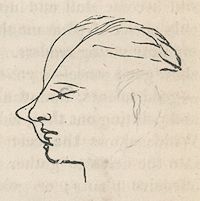
The true art of the painter is to seize upon the agreeable expression of the person he would represent, and to portray it so that all will know it at once as a likeness. The art of doing this is a noble art, and it requires ability and genius to excel in it.
Now, these remarks may be fairly applied to moral painting: it is easy, in speaking of others, to draw caricatures of them and to make them seem ridiculous. i am afraid, it is because the thing is so easy
-----
p. 38
that it is so common. Why is so much of our conversation made up of uncharitable talk about our neighbours, companions—perhaps those we call our friends? Is it not because the heart is wrong and loves scandal—caricature—ridicule—and the tongue finds it easy to exercise itself in this way?
Perhaps my readers may think that they will become dull and uninteresting, if they only speak of pleasant things. It is not so, my dear young readers. Nothing can better show good sense—a good heart—good taste—good talents, than the habit of perceiving and pointing out the good qualities of others. Which shows the best taste—going forth into the fields to gather noxious weeds and offensive plants; or going forth to gather sweet-scented flowers and lovely blossoms? Which is most lovely—one who is addicted to making and exhibiting nosegays, gathered and grouped from the pleasant things in the characters of their friends; or one who is in the habit of treasuring up the unpleasant things they can discover in those around them, and retailing them for the poor compensation of a smile or a laugh?
-----
p. 39
To illustrate the advantages of dealing in the good things which we may see in others, if we will only seek for them, let me tell you a matter of fact. I have the pleasure to know a lady, who is one of the most agreeable, the most gifted, and the most famous in America, and though I have known her intimately for years, I never heard her say an unkind word of any living being!
This lady has written many books—some of prose and some of poetry, and her name is honoured as well in the Old World as the New; yet you cannot find in them a page of satire, or a sentence of misanthropy. All is charity—all is a display of the beautiful in nature and the lovely in character; she is enamoured of beauty and virtue wherever they dwell, and her books as well as her conversation are but exhibitions of that holy affection. What a glorious thing it is to have a heart to admire and a genius to display the loveliness which God has scattered over the landscape, and made to flourish and bloom in the human bosom!
Though I have said a good deal more than I intended on charity, still there is
-----
p. 40
much more to be said of it. The Bible tells us that it covers a multitude of sins, which means, that a person who has true charity will seek rather to hide than to display the faults of others.
Alas, how unhappy should we be, if God, who looketh on the heart, and sees all our motives, were not more kind and charitable to us, than we are to our fellow-men! If we would hope for mercy above, let us practise it here below.
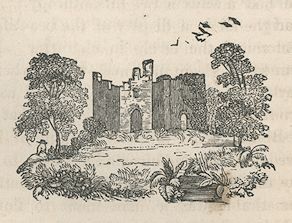
-----
[p. 41]
CHAPTER VIII.
CHARITY.
History of the Two Seekers.
There were once two boys, Philip and Frederick, who were brothers. Philip waqs a cheerful, pleasant, good-natured fellow; he had always a bright smile on his face, and the mere sight of him made everybody feel an emotion of happiness. His presence was like a gleam of sunshine, peeping into a dark room—it made all light and pleasant around.
Beside this, Philip had a kind heart; indeed, his face was but a sort of picture of his bosom. But the quality for which he was remarkable was a disposition to see good things only in his friends and companions: he appeared to have no eye for bad qualities. If he noticed the faults, errors, or
-----
p. 42
vices of others, he seldom spoke of them. He never came to his parents and teachers, exaggerating the naughty things that his playmates had done. On the contrary, when he spoke of his friends, it was generally to tell some pleasant thing they had said or done. When he felt bound to notice another’s fault, he did it only from a sense of duty, and always with reluctance, and in mild terms.
Now Frederick was quite the reverse of all this. He loved dearly to tell tales. Every day he came home from school, giving an account of something wrong that had been done by his playmates, or brothers and sisters. He never told any good of them, but took delight only in displaying their faults. He did not tell his parents or teacher these things from a sense of duty, but from a love of telling unpleasant tales. And, what was the worst part of it all, was this: Frederick’s love of tale-bearing grew upon him, by indulgence, till he would stretch the truth, and make that which was innocent in one of his little friends appear to be wicked. He seemed to have no eye for pleasant and good
-----
p. 43
things—he only noticed bad ones: nay, more, he fancied that he saw wickedness, when nothing of the kind existed. This evil propensity grew upon him by degrees; for you know that if one gets into a bad practice, and keeps on in it, it becomes at last a habit which we cannot easily resist. A bad habit is like an unbroken horse, which will not mind the bit or bridle, and so is very apt to run away with his rider.
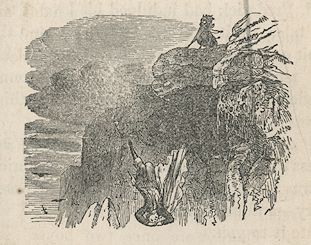
It was just so with Frederick: he had got into the habit of looking out for faults, and telling of them, and now he could see nothing else, and talk of nothing else.
The mother of these two boys was a
-----
p. 44
good and wise woman. She noticed the traits of character we have described in her sons, and while she was pleased with one, she was pained and offended on account of the other. She often talked with Frederick, told him of his fault, and besought him to imitate his amiable brother: but as I have said, Frederick had indulged his love of telling tales, till it had become a habit, and this habit every day ran away with him. At last the mother hit upon a thing that cured Frederick of his vice—and what do you think it was?
I do not believe that any of you can guess what it was that cured master Frederick. It was not a pill, or a poultice; no, it was a story—and as I think it a good one, I will relate it to you.
“There were once two boys,” said the mother, “who went forth into the fields. One was named Horace, and the other was named Clarence. The former was fond of anything that was beautiful—of flowers, of sweet odours, of pleasant landscapes. The other loved things that were hideous or hateful—as serpents and lizards—and his
-----
p. 45
favourite haunts were slimy swamps and dingy thickets.
“One day the two boys returned from their rambles; Horace bringing a beautiful and fragrant blossom in his hand, and Clarence bringing a serpent. They rushed up to their mother, each anxious to show the prize he had won. Clarence was so forward, that he placed the serpent near his mother’s hand: on which the reptile put forth his forked tongue, and then fixed his fangs in her flesh.
“In a moment a pain darted through the mother’s frame, and her arm began to swell up: she was in great distress, and sent for the physician. When he came, he manifested great alarm, for he said the serpent was an adder, and its bite was fatal, unless he could find a rare flower, for this alone could heal the wound. While he said this, he noticed the blossom which Horace held in his hand. He seized upon it with joy, saying—‘This, this is the very plant I desired!’ He applied it to the wound, and it was healed in an instant.”
But this was not the whole of the story.
-----
p. 46
“while these things were taking place, the adder turned upon the hand of Clarence, and inflicted a wound upon it. He screamed aloud, for the pain was very acute. The physician instantly saw what had happened, and applying the healing flower to the poor boy’s wound, the pain ceased, as if by enchantment, and he, too, was instantly healed.”
Such was the story which the mother told to her two sons. She then asked Frederick if he understood the meaning of the tale. The boy hung his head, and made no answer. The mother then went on as follows:
“My dear Frederick—the story means that he who goes forth with a love of what is beautiful, pleasant, and agreeable, is sure to find it: and that he who goes forth to find that which is evil, is also sure to find what he seeks. It means that the former will bring peace and happiness to his mother, his home, his friends; and that the latter will bring home evil—evil to sting his mother, and evil that will turn and sting himself. The story means that we can find good, if we seek it, in our friends, and that this good
-----
p. 47
is like a sweet flower, a healing plant, imparting peace and happiness to all around. The story means that we can find or fancy evil, if we seek for it, in our friends; but that, like an adder, this only wounds others, and poisons those who love to seize upon it.”
Frederick took the story to heart; he laid it up in his memory. When he was tempted to look out for the faults of his companions, and to carry them home, he thought of the adder, and turning away from evil, he looked out for good; and it was not long before he was as successful in finding it as his brother Philip.
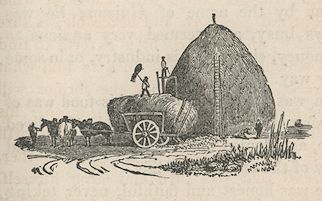
-----
[p. 48]
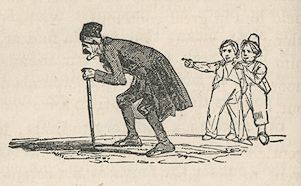
CHAPTER IX.
CHARITY.
In the southern part of France is a large city called marseilles: here there once lived a man by the name of Guizon; he was always busy, and seemed very anxious to get money, either by his industry, or in some other way.
He was poorly clad, and his food was of the simplest and cheapest kind: he lived alone, and denied himself all the luxuries and many of the comforts of life.
He was honest and faithful, never taking that which was not his own, and always performing his promised; yet the people of
-----
p. 49
Marseilles thought he was a miser, and they held him in great contempt. As he passed along the streets, the rich men looked on him with scorn, and the poor hissed and hooted at him. Even the boys would cry out, “There goes old Skinflint.”
But the old man bore all this insult with gentleness and patience. Day by day, he went to his labour, and day by day, as he passed through the crowd, he was sluted with taunts, and sneers, and reproaches.
Thus time passed on, and poor Guizon was now more than eighty years of age. But he still continued in the same persevering industry, still lived in the same saving, simple manner as before.
Though he was now bent almost double, and though his hair was thin and as white as snow; though his knees tottered as he went along the streets; still the rude jokes and hisses of the throng pursued him wherever he went.
But, at length, the old man died, and it was ascertained that he had heaped together in gold and silver, a sum equal to forty thousand pounds. On looking over his
-----
p. 50
papers, his will was found, in which were the following words:
“I was once poor, and I observed that the poor people of Marseilles suffered very much for the want of pure, fresh water. I have devoted my life to the saving of a sum of money sufficient to build an aqueduct to supply the city of Marseilles with pure water, so that the poor may have a full supply.”
Let us be careful how we judge others uncharitably, in denouncing, ridiculing, persecuting those who live differently from what we do—who seem to us to be narrow-minded and selfish—it may be that we are doing them great injustice, and injuring those who are in reality far better than ourselves. let us, rather, be charitable, for this is always safe.
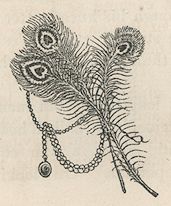
-----
[p. 51]
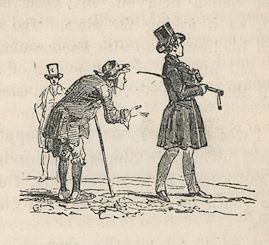
CHAPTER X.
CHARITY.
One evening as I was passing along a street in Boston (in America,) I saw a poor ragged fellow, known by the name of Simple Simon. He had in his face a look of melancholy, and his clothes bespoke at once poverty and neglect. He was in fact a harmless, helpless creature, having hardly common sense, and living for the most part upon charity.
-----
p. 52
As I came near him, a finely-dressed young man passed him by. According to his habit, Simple Simon held out his hand to the youth, as if asking for alms. The latter turned his head aside with unconcealed disgust, and making no other reply to the beggar than this look of aversion, went his way.
As I was curious to see the effect of this rudeness upon poor Simon, I went up to him, and after a little conversation, I spoke of the youth in a manner to draw out his feelings.
“You say he is a handsome fellow, and so he is,” said Simon: “and he is a good young man, too, for aught I know; but he cannot condescend to speak to me: and why should he? I am now a poor creature and unfit to be spoken to by one who wears a good coat and kid gloves, and is the son of a great man. Why should he speak to Silly Simon?”
“Then you know him, do you?” said I.—“Know him!—yes,” said the beggar, “and his father before him. His father was a rich man and president of a college. My father was poor, but still he wished to have
-----
p. 53
his children well educated; so he sent my brother Ben to the university. But things went ill with my father; and as the saying is—worse always comes behind to kick bad down hill. Still, Ben was a good scholar, and my father did not take him from the college, hoping and striving all the time to make things improve: so he got in debt to the college, for Ben’s instruction.
“Well, one day my father had a sheriff’s officer sent after him, and as he could not pay the debt, he was taken to prison. Now, I do not mind being sent to prison myself, for I am a poor good-for nothing. I have been sent there several times, and though I never knew what it was for, still it is all the same to Silly Simon. But my father was a sensitive man, and to be shut up in a stone room, where the air was damp and close, was a strange thing to him. He was a little nervous too, I believe, for it affected him very much. He had been respected by the world at large, and had spent his life in acts acknowledged to be beneficial to mankind: and now, to be confined as if he were guilty of some crime, and unworthy of breathing
-----
p. 54
the fresh air, and of holding intercourse with his fellow-men! all this turned his head. It affected him the more, that the blow came from the college which ought, as he said, to set examples of humanity.
A friend went to the president and begged him to let my poor father out of prison, but he pretended to know nothing about it, and refused to interfere. At last some friend, hearing of my father’s situation, paid the debt and he was released. But the affair sunk deep into his heart; and perceiving that the richer and more respectable members of society took part with the president; that the latter was kept in his place, and not only vindicated but cherished—while he was himself neglected and despised, because he had become poor and been put in prison—he lost his confidence in mankind and himself, and soon died of a broken heart.
“Misfortunes never come single you know—so, soon after my father died, poor Ben followed. I was left destitute, and there was no one to care for me. By and by I was taken sick of a fever: it settled on my brain, and left it at last in a terrible
-----
p. 55
state. I never could get it fairly cleared up, and all the better it is for me. If I had my senses, then the things of which I tell you would make me unhappy; but as it is, I am contented. I can see the president’s son pass by in scorn, and feel sorry for him; for, after all, I think it must give him more pain than it does me. Poverty is a sad thing, Mr. Parley, but there is something worse.”
“And what is that?”
“Selfishness,” said Simon; “that kind of selfishness which makes a man forget how others feel. I am poor, silly, as they call me,—but still, I never forget what is going on in the breasts of others. There are some men so proud, so lofty that they regard a great part of their fellow-men as little as we do worms and insects in our path. They stride proudly on, thinking that if any one is crushed beneath their mighty tread, it is because he gets in their way, and this is all they think or care about it. Now I am one of those worms and I have often been trod upon. I know the agony—the cruel agony which attends such cases; and I therefore feel for every human being who suffers. I
-----
p. 56
would not even tread upon a worm, if I knew it.”
I left the poor beggar with his words treasured in my heart: and I drew this lesson from his story,—that a beggar may still impart truth and wisdom; that under the garb of poverty, there may be something to respect and admire; that even seeming weakness has often a touching moral for those who will listen and learn; and that God sends down to the crushed bosom, in kindness and for consolation, that mantle of charity, which is even better than garments of purple and fine linen.
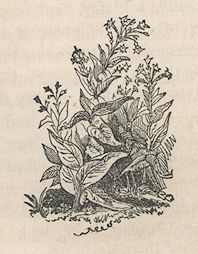
-----
[p. 57]
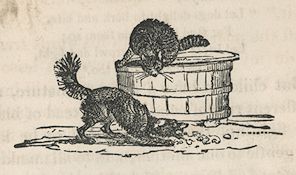
CHAPTER XI.
SELFISHNESS.
A dog and a cat were once sitting by a kitchen door, when the cook came out and threw several pieces of meat to them.
They both sprang to get it, but the dog was the strongest, and so he drove the cat away, and devoured all the meat himself. this was selfishness; by which I mean, that the dog cared only for himself. The cat wanted the meat as much as he did; but he was the strongest, and so he took it all.
But was this wrong? No,—because the dog knew no better. The dog has no idea of God, or of that beautiful golden rule of conduct, which requires us to do to others as we would have them do to us.
-----
p. 58
Dr. Watts says,—
“Let dogs delight to bark and bite,
For God hath made them so;
Let bears and lions growl and fight,
For ’tis their nature too.”
But children have a different nature, and a different rule of conduct. Instead of biting and fighting, they are required to be kind and gentle to one another, and to all mankind.
Instead of being selfish, like the dog, they are commanded to be just and charitable; by which I mean, that they should always give to others what is their due, and also give to others, if they can, what they stand in need of.
If a child snatches from another what is not his, he is selfish and wicked. If a child tries in any way to get what belongs to another, he is selfish, and is in his heart a thief or a robber. Selfishness is caring only for one’s self. It is a very bad thing, and every one should avoid it. A selfish person is never truly good, or truly happy, or truly beloved, when his character is known.
How miserable should we all be, if every person was to care only for himself! Suppose children and grown-up people, were all to be as selfish as cats and dogs; what constant fighting there would be among them.
-----
[p. 59]
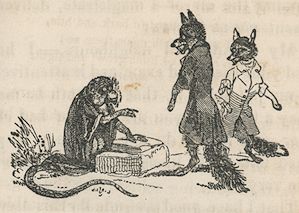
CHAPTER XII.
THE VALUE OF CHARACTER.
I shall relate a fable to you, which shows what a bad thing it is to have a stain on one’s character, and how it may sometimes subject one to be punished for what one has not committed.
A wolf once made complaint that he had been robbed, and charged the theft upon his neighbour the fox. The case came on for trial before a monkey, who was justice of the peace among the quadrupeds in those parts. The parties did not employ lawyers, but chose to plead their cause themselves. When they had been fully heard, the judge,
-----
p. 60
assuming the air of a magistrate, delivered his sentence as follows:
“My friends and neighbours,—I have heard your case, and examined it attentively; and my judgment is, that you both be made to pay a fine; for you are both of bad character, and if you do not deserve to be punished now, it is likely you will deserve to be so very soon.
“That I have good grounds for this decree, is sufficiently evident by the fact, that Mr. Wolf’s jaws are even now stained with blood, and I can see a dead chicken sticking out of Sir Fox’s pocket, notwithstanding the air of injured innocence which he wears. And beside, one who gets and evil reputation should think it no hardship if he is occasionally made to suffer for a crime he did not commit.”
This fable teaches us to beware of an evil reputation; for it may cause us to be punished for the misdemeanors of others. Thus, if a person gets the character of a liar, he will not be believed when he tells the truth; and when a theft is known, it is of course laid to some one who has been caught in stealing before.
-----
[p. 61]
CHAPTER XIII.
JUSTICE.
Justice is rendering to others what is their due, and not only requires of us fair dealing in matters of property, but it requires of us fair dealing in all the intercourse of life. Every kind of advantage we take of others, even in the smallest things, bespeaks the spirit of injustice, and is to be condemned.
The child that snatches away another’s toys; the shrewd and knowing boy that overreaches his more simple fellow in a barter of penknives; the person who gives currency to a scandalous tale; all these are guilty, at the bar of conscience, of the crime of injustice.
One of the most common and yet most mischievous kinds of injustice is that of putting false and injurious constructions on the actions of others. How often do we hear people say,—such a one is proud—that man
-----
p. 62
is seeking display—this one is puffed up with conceit! In most cases these imputations are false, and therefore unjust. How wicked then is this practice of evil speaking, as it does much harm and no good!
If I were to draw the portrait of a truly noble character, I should make justice the basis of it. A just person must have many virtues; he must be a lover of truth, a lover of honesty, a lover of what is right. He must despise falsehood, trick, deception and fraud of any kind. Let any of my readers who desire to adorn their souls with a noble attribute, cultivate justice, not only in deeds, but in words, thoughts, and feelings. Let them be just even in the little arguments that arise around the fireside, in all the familiar intercourse, sports, pleasures, and controversies of the field, the high road, and the schoolroom. Let them establish the habit of being just, even in trifles: let them cherish the feeling of justice as they would the dearest friend.
-----
[p. 63]
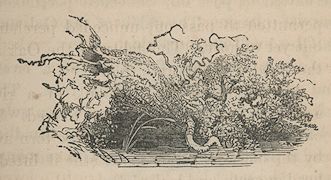
CHAPTER XIV.
HUMILITY.
This is a humble virtue, yet a most lovely one. Jesus Christ has said that the poor in spirit—the humble—the meek—are blessed, for they shall see God. What a mighty preference! what a noble promise! Humility is, therefore, a pearl of great price, and is really better than money and lands and merchandise. It is not the rich, not the haughty, the proud man, but the humble one that is to see God.
Humility is often of great advantage in life; for when the proud are resisted and crushed, the meek and lowly are frequently
-----
p. 64
permitted to pass on, unheeded perchance, but yet unhurt. The fable of the Oak and the Reed will illustrate this.
An oak stood on the bank of a river, and growing at its foot was a reed. The oak was aged, and its limbs were torn away by the blasts of years; but still it lifted its head in pride, and looked down with contempt upon the reed.
At last there came a fearful tempest. The oak defied it, but the reed trembled in every fibre. “See,” said the oak, “the advantage of strength and power; see how I resist and triumph!”
While it spoke thus, a terrible rush of the gale beset it, its roots gave way, and it fell to the earth with a tremendous crash. But while the oak was thus destroyed in its pride, the humble reed bowed to the blast, and, when the storm was over, it arose and flourished as before.
-----
[p. 65]
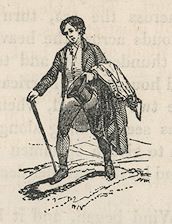
CHAPTER XV.
MILDNESS.
The Sun and Wind once fell into a dispute as to their relative power. The Sun insisted that, as he could thaw the iceberg, and melt the snows of winter, and bid the plants spring out of the ground, and send light and heat over the world, he was the most powerful. “It may be,” said he to the Wind, “that you can make the loudest uproar, but I can produce the greatest effect. It is not always the most noisy people that achieve the greatest deeds.”
“This may seem very well,” said the
-----
p. 66
Wind; “but it is not just. Do I not blow the ships across the sea, turn windmills, drive the clouds across the heavens, get up squalls and thundergusts, and topple down steeples and houses with hurricanes?”
Thus the two disputed, when, at last, a traveller was seen coming along; and they agreed each to give a specimen of what he could do, and let the traveller decide between them.
So the Wind began, and it blew lustily. It nearly took away the traveller’s hat and cloak, and very much impeded his progress: but he resisted stoutly. The Wind having tried its best, then came the Sun’s turn. So he shone down with his summer beams, and the traveller found himself so hot that he took off his hat and cloak, and almost fainted; he soon decided that the Sun had more power than the Wind.
Thus our fable shows that the gentle rays of the Sun were more potent than the tempest; and we generally find in life that mild means are more effective, in the accomplishment of any object, than violence.
-----
[p. 67]
CHAPTER XVI.
CANDOUR.
Candour is that state of heart which disposes a person to see and confess the truth. It belongs to all real lovers of truth. Without it no person can be honest, just, sincere, or faithful.
It is a most important virtue, for it lies at the very root of goodness, and is indispensable to rectitude of conduct and real force of character. Candour is opposed to prejudice: while prejudice would blind the mind, candour would give it clearness of perception. Candour is like a clear atmosphere, enabling us to see objects distinctly: prejudice is like a wrinkled glass, that would distort the objects which are seen through it. Candour would wipe clean the spectacles of the mind: prejudice would obscure them, or perhaps paint them over with false and decpetive images.
-----
p. 68
Candour is opposed to many other vices, all of which are unfriendly to truth. Disingenuoousness, which would conceal the truth by some deceptive veil; artifice, which would make falsehood pass for truth; improper concealment, which would hide the truth where it is required; moral cowardice, which makes one fear the truth; these mean yet dangerous and besetting vices are all opposed to candour. If any of my readers feel that any of these sad diseases are in their souls, let them administer candour, for this is a certain cure for them all.
Candour is necessary to those who would be wise, for wisdom consists in knowing the truth; and how can one see and know the truth, if he is blinded by an imperfect vision, or misled by an atmosphere that presents objects either falsely or obscurely?
Candour is not only thus useful and necessary, but it is a most delightful grace in character. No person can be amiable without it: no person can have sincere friends without it; no person can possess true beauty of soul without it. The face is usually an index to the soul; it is a sort of mirror re-
-----
p. 69
flecting the passions that are within. If a person is destitute of candour, destitute of a love of truth, and therefore a lover of falsehood, the face is very apt to tell the sorry tale. If, on the contrary, a love of truth is in the heart, it is likely to shine forth in that which we call the expression. Think of this, my gentle friends—think of this; and if you would have true beauty of face, take care to make candour an habitual tenant of the soul.
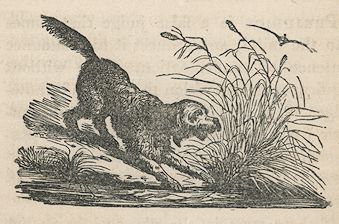
-----
[p. 70]
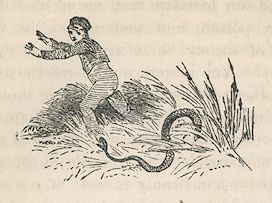
CHAPTER XVII.
PREJUDICE.
Prejudice is a false judge that comes into the mind, and induces it to pronounce sentence of condemnation, either without inquiry, or in opposition to truth and knowledge. It is a thief that steals truth and candour from the soul, leaving it in the possession of malice, envy, or falsehood—whichever may make the strongest appeal to self-love or selfishness.
If there were in the place where we live some horrid monster, as, for instance, a fierce lion that infested the path of the traveller, or an insidious serpent that stole
-----
p. 71
around our footsteps and stung us with its deadly poison, how soon would the whole mass of society be in arms to destroy the enemy. Yet prejudice is more hurtful to the peace of mankind; it is a thousand times more destructive of human happiness than such a monster or such a reptile as we have supposed. Iit is a snake in the grass, that poisons our souls unseen: it is a spider that weaves its fatal web in the chambers of thought, and carries on its work of destruction in silence and secrecy.
Prejudice influences us without our being fully aware of its presence; and after we have got into the habit of acting according to its dictates, we often think that we are doing right when we are doing very wrong. I shall endeavour, by a few tales and incidents, to show some of the ways in which we are influenced by prejudice.
Prejudice Conquered.
Several children were one day passing by a church, when they noticed a litt girl, sitting on a stile. One of the elder
-----
p. 72
girls of the group, whose name was Lydia Flair, thus spoke to the girl upon the stile.
“Well, Miss Gridley, pray what are you doing there?”
The girl looked up with some surprise at this rude speech, but answered mildly,—“Oh, I am sitting here, because it is so pleasant all around.”
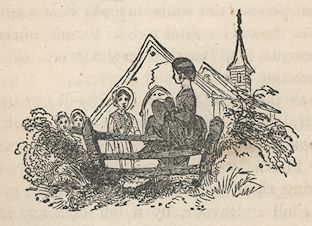
“Very sentimental, indeed!” said Lydia; and the little party moved along.
“Do you know Grace Gridley?” said Ellen Lamb, one of the party, to Lydia.
“To be sure I do, and I hate her,” was the reply.
“Hate her!” said Ellen; “that is a strong expression,—and why do you hate her?”
-----
p. 73
“Oh, I do not know, exactly!” said Lydia; “but she goes to church three times on a Sunday, and associates with people that pretend to be so pious, and so much better than other people.”
“You hate her, then, because she goes to church so often?” said Ellen.
“Why that is not all: she has such a prim precise air; there is always something about her so correct, that I feel uneasy where she is. Beside, everybody says she is good and handsome, and all that. I hate people that are always praised by everybody, for I believe they are no better than other people, and are only more deceitful.”
“You feel, perhaps, a sort of envy, and this may lead you to see their conduct in a false light. Envy and prejudice, Lydia, will often deceive us. Now I know Grace Gridley, and I think her as different as possible from what you think her to be. So far from being precise and hypocritical, she is one of the most frank, sincere, and kind-hearted creatures that I ever knew. I wish you would allow me to make yoou better acquainted with her.”
-----
p. 74
“No, no—I know enough of her: I could never like her.”
“You would like her—you could not help it. Come! go back with me, and let us see a little more of Grace.”
Lydia permitted herself, though very reluctantly, to be led back to the place where Grace was sitting. She had not only a vague dislike of her, from the fact that Grace went to church so often, and was one of those whom her own parents were in the habit of calling stiff, over-righteous, and bigoted; but she had now been impertinent to Grace, and as we are apt to dislike those whom we have injured, Lydia had a new motive for prejudice against her. However, the party were soon brought back to the stile, and grace was induced to join them. She made herself agreeable to all; and before Lydia parted, the first steps were taken toward a better acquaintance. The final result of this was, an entire change of feeling and opinion, on the part of Lydia, toward Grace.
A few months after the scene we have described, the following conversation took place between Ellen Lamb and Lydia Flair.
-----
p. 75
E. So you confess that you like Grace Gridley, after all?
L. Why I cannot help liking her; she is as different as possible from what I conceived she was: I thought her bigoted,—but I find, although she is very pious, and very firm in her principles, that her heart is overflowing with kind and generous feelings. I deemed her deceitful,—but she is frankness itself. I expected that she would be severe and censorious—but she is the most considerate and charitable creature in the world. Although very handsome, yet she seems not to care anything about it. I never saw any one that I liked so much, and if I had committed a fault, I would sooner go to her, confess it, and ask her advice in the matter, than to any other person.
E. I am glad to hear you say that, for it is no more than just. But, my dear Lydia, I wish you to reflect one moment, and then tell me what it was that made you once dislike Grace so much, and do her such injustice?
L. I have told you, I believe; I told you
-----
p. 76
she associated with stiff, over-pious people, and I supposed she must be stiff and shining herself.
E. In other words, you had a prejudice against her; you had a dislike, without any just reason. Let us take care of such prejudices, my dear Lydia! and allow me to ask if you are not indulging the same unreasonable feeling, when you speak of Grace’s friends and associates, as stiff and whining and hypocritical?
L. Oh no—at least, I think not.
E. And yet, Lydia—you do not know these people. Is not this in itself wicked? Observe how this false reasoning misled you in respect to Grace Gridley. It led you to call her bigoted and hypocritical—whereas, you now admit, that she is the reverse of all this. Only think of the awful injustice you did her;—you tried to steal away her good character, and committed that worst of all cruelty—you gave her a bad name.—
Here Lydia, stung to the heart with a sense of her error, burst into tears: she was thoughtless, but not hardened, and had only done as too many do; she had indulged
-----
p. 77
prejudice—and thus had been guilty of great wickedness. She had done thus, in partial ignorance of her sin, for as I have said prejudice is like a spider—it creeps slily into the mind, and takes possession of it unseen, and often hangs it over with dismal cobwebs, which are invisible to the owner of the tenement, though plain enough to the eye of God and man.
The Story of Aristides.
There is a story handed down us in the history of ancient Greece, which shows us that prejudice may even lead ignorant and wrong-minded people to dislike and oppose excellence.
There was in Greece, a man named Aristides, so celebrated for his integrity, his honesty, his love of truth and his uprightness, that he was called Aristides the Just. Well, in consequence of a false charge brought against him by some of his enemies, whose unjust proceedings he had opposed, the people of Athens were about to banish him from the city, but before this
-----
p. 78
could be done, the vote of every citizen was to be taken.
It was the custom for the Greeks in those days to vote for the banishment of a person by handing in tiles, or shells, on which the name of the accused was inscribed. An ignorant fellow, at the time of voting, seeing Aristides near, and not knowing him, but judging him to be a man of education, and capable of writing, went up and asked him to write the name of Aristides on his tile.
Aristides did as he was requested, and having handed the tile to the man, asked him, as a matter of curiosity, why he wished to banish Aristides. “Because,” said the freeman, “I am tired of hearing him called the Just.”
Here then, we see that a man, even acting in the high and responsible capacity of a freeman, indulges an unreasonable dislike, a prejudice,—he even allows a hatred o[f] excellence to influence him, when he is exercising a trust which involves the happiness of the whole community.
-----
p. 79
Truth Triumphant.
It sometimes happens that people living in the same town or village, without any good reason, contract a dislike of each other, and when they meet scarcely speak to each other: they are cold and distant, and by degrees get into the habit of thinking and speaking ill of each other.
One day as john Sawyer and Allen Highsted, both of whom lived in the village of Tintonex, met each other,—the former addressed the latter with a pleasant salutation, which was received with a cold look and a silent tongue. When one of his companions, Seth Mead, asked Allen why he treated Johnthus, “I do not like him,” was the reply.
“And why do not you like him?” said Seth.
“Because I do not,” says Allen; “and what is more—because I will not.”
“But this is unreasonable,” said the other.
-----
p. 80
“It may seem so—yet I have my reasons[,]” said Allen. “I think he is an impudent upstart.”
“Indeed! Are you acquainted with him?”
“No, and I do not wish to be: he is in a different condition of life from what I am; his father is a shopkeeper, and mine is a merchant. How should we have any intercourse? We cannot feel alike; we cannot live alike. Our manners, our tastes, our pursuits, our associates must all be dissimilar. Beside, he is a mean-spirited, narrow-minded fellow.”
“You were never more mistaken, Allen Highsted—never more in your life. John is a frank, honest, noble-minded fellow: and though his father is a shopkeeper, the boy is as well-bred, and has as good manners as any other in the village. Indeed, I think he is a pattern of good manners and right feelings. My father is, as you know, a man of large fortune; he has been well educated, and has seen the best society in this and other countries; and he thinks very highly of John’s father, and he encourages me to associate with John.”
-----
p. 81
“Well, you can do as you like—but I hate the fellow.”
“And will you indulge a hatred without reason?”
“No—I have reason for what I say and feel. John dislikes me, and takes every opportunity to say things against me.”
“Do you know this?”
“I know it as well as I wish to.”
“Can you cite an instance?”
“Yes—no longer ago than yesterday, in that affair of Lacy’s; I have reason to suppose that he caused me to be suspected of frightening the child into fits, about which there was such a clamour.”
“Well, what reason had you to suppose so?”
“Why, it is just like him; beside, I was suspected, and how should that have happened if he did not bring it about?”
“Let me tell you the truth, Allen. You were suspected, because you were seen near the place about the time the thing happened. I was at Lacy’s house last evening, and there were several people there talking about it. It was said that you frightened the child, but John Sawyer defended you
-----
p. 82
bravely: if he had been your brother, he could not have spoken of you more kindly. There were some evil-minded persons there, who knew that you had treated John ill, and they tried to make him take revenge of you, by helping on the suspicion against you. But he was above it all, and believing you innocent, he was too noble, too just, to try to make people think you guilty.”
“Indeed!—indeed!”—said Allen, reddening deeply; “is this so? How wicked—how cruel, then have I been! Forgive me, pray forgive me, my dear fellow.”
“I forgive you with all my heart,” said Seth;—“I have, indeed, nothing to forgive; but I shall be most happy to see you dismiss such a prejudice as you have indulged toward John Sawyer: he is really a fine fellow, and worthy of your esteem.”
“I believe it—I know it,” said Allen; “and I fear that I have had a secret consciousness, all the time, that I was doing him wrong. I tried to think ill of him, and I spoke ill of him, only because I did not know him, or because I felt that his excellence was a kind of reproach of me. I had treated him ill, too, on many occasions, and
-----
p. 83
being conscious of this, I wished to excuse my injustice by making him out a bad fellow: so I took a malignant and satirical view of all he did, and tried my ingenuity to prove myself just and right. But, my dear friend, I am cured of this weakness for ever. I will go this instant to John, and make him a due apology for my rudeness and unfairness.”
—
I hope these sketches will be sufficient to show my readers some of the most common forms in which prejudice operates, and how it frequently contrives to cheat and mislead mankind. Let us all guard against it as a great enemy to our present and future peace. It is a fierce and malignant tyrant, always seeking dominion over us, and when once enshrined in the heart, it is difficult to resist its influence or check its authority.
All those who desire to be free-minded, fair-minded, just and true, should strictly examine every personal dislike they feel: they should be careful to analyse it—see upon what it rests—and if it be unfounded, if it be but a prejudice, let them cast it out if they would not harbour an evil spirit in the heart.
-----
[p. 84]
CHAPTER XVIII.
MERCY.
The merciful person considers the feelings of verything that lives and feels: suffering in others never fails to give him pain and to awaken in him a desire to alleviate or remove it. I shall tell you a little story in illustration of this excellent quality.
The Young Fisherman.
James Ferris was permitted to go to the bridge to amuse himself with fishing. He put down the hook, and after various nibbles, drew forth a perch. It was beautifully marked with black and gold stripes, and as it jumped and writhed on the hook, the little boy felt delighted. “I have caught a fish!” said he, in exultation, to his companions. It was the first he had ever caught, and he experienced as sincere a feeling of triumph as did Alexander when he gained a battle.
-----
p. 85
Elated with his prize, James put a little notched stick through one of the gills, and bore it home. “I have caught a fish!” said he to every one he met. Having announced his good luck to all the household, he took the perch and put it into a bowl of water. But alas, it was dead! it floated sideways upon the water, but it was without life and motion. With a sad face, he went to his mother.
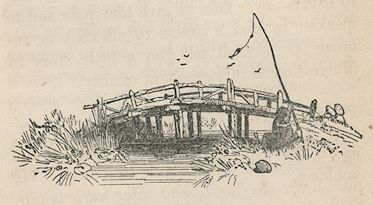
“Mother,” said he, “my fish is dead. I wish it was alive again! Cannot you bring it to life?”
“No, my boy, it is impossible,” was the answer.
“I am sorry I killed it,” said James, the tear gathering in his eye; “it was so happy
-----
p. 86
and so beautiful in the water! Do fishes feel, mother?”
“Yes, my child.”
“And did this poor perch suffer as much when the hook was in his mouth, as I should if I was drawn up with a hook in my mouth?”
“Perhaps not quite so much,” said the mother, “but no doubt it must be a cruel death for the poor little fish to die; to have his mouth torn with a hook, and to be drawn from the element in which he is formed to live, into one where he must immediately perish.”
“I will never kill and torment a fish again for my amusement,” said James, sobbing.
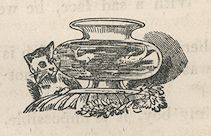
-----
[p. 87]
CHAPTER XIX.
COURAGE.
Courage is of two kinds—physical and moral. physical courage is that which makes a person dare to face danger to the body: moral courage is that which makes a person dare to do right, to tell the truth, to be just and honest, even when such conduct may bring reproach or ridicule.
Physical courage belongs particularly to men and boys, who should be ashamed to shrink from any duty because there is danger in it. Courage too has been often exhibited by women. We are told of a mother in ancient times, who saw a tiger about to seize her infant. Thoughtless of the danger to herself, she sprung to her child, clasped it in her arms, and faced the furious beast, as if to say, “Before you devour my child, you must devour me!” The tiger was confounded at this act of reso-
-----
p. 88
lution, and as if abashed, slunk away and was seen no more! The last incident of this story is not quite so likely as the first, but it exemplifies my meaning.
Boys and Girls.
“Ah, James, that is not fair, to tempt your sister upon the thin ice, so that she may get a ducking! This teasing of sisters, my boy, is poor sport,—you of the stronger sex should always be the defenders of the weaker ones.”
A man who in any way insults a woman is held in universal contempt: he is justly deemed a coward, for he insults one weaker than himself, and he does it because he feels that he is safe from punishment. Now a boy who teases, insults, or injures a girl, has the spirit of cowardice in him, for he does injury upon the mean calculation that he has nothing to fear from retaliation.

-----
[p. 89]
CHAPTER XX.
PATIENCE AND IMPATIENCE.
I could write a book about patience, for it is of the greatest importance in life. It enables us to keep our minds clear, so that we may see and observe the truth; it enables us to govern our passions,—to wait and choose, not only the proper time, but the proper mode of action.
There is many a pleasure in life which we might possess, were it not for our impatience. Young people, especially, miss a great deal of happiness, because they cannot wait till the proper time.
A man once gave a fine pear to his little boy, saying to him, “The pear is green now, my boy; but lay it by for a week, and it will then be ripe, and very delicious.”
“But,” said the child, “I want to eat it now, father.”
-----
p. 90
“I tell you it is not ripe yet,” said the father. “It will not taste pleasantly, and, beside, it will make you will.”
“No, it will not, father; I know it will not, it looks so good. Do let me eat it?”
After a little more teasing, the father consented, and the child ate the pear: the consequence was, that the next day he was taken ill. Now all this happened because the child was impatient: he could not wait, and, accordingly, the pear that might have been very pleasant and harmless, was the occasion of severe illness. Thus it is that impatience, in a thousand instances, leads children, and pretty old ones too, to convert sources of happiness into actual mischief and misery.
There were some boys once who lived near a pond; and when winter came, they were very anxious to have it frozen over, that they might slide and skate upon the ice. At last, there came a very cold night, and in the morning the boys went to the pond, to see if the ice would bear them. Their father came by at the moment, and seeing that it was hardly thick enough, told the boys that it
-----
p. 91
was not safe yet, and advised them to wait another day before they ventured upon it.
But the boys were in a great hurry to enjoy the pleasure of sliding and skating: so they walked out upon the ice; but pretty soon it went crack—crack—crack! and down they were all plunged into the water. It was not very deep, so they got out, though they were very wet and uncomfortable; and this happened because they would not wait.
Now these things, though they may seem to be trifles, are full of instruction. They teach us to beware of impatience, to wait till the fruit is ripe, and not to skate till the ice will bear; they teach us that the cup of pleasure, seized before the proper time, is turned into poison: they show us the importance of patience.
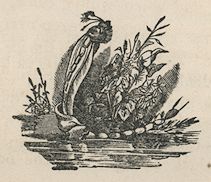
-----
[p. 92]
CHAPTER XXI.
CHEERFULNESS AND GLOOM.
There was once a Fairy who, as she was playing among the flowers, felt a chill breath of wind, and saw two or three of the blossoms fall dead at her side. She immediately arose and looked around, and beheld a tall woman, like a witch, standing near: though covered with furs, she was shivering with cold.
“What do you do here?” said the Fairy.
“I am commanded to try my power with thine,” said the Ogress, in a harsh tone.
“And how shall this be done?” said the Fairy.
“I have my wand, and thou hast thine,” was the reply.
“Let me see a touch of thy skill,” said the Fairy. Here the witch waved her wand, and suddenly a blast of wind was heard roaring in the adjacent forest. The green leaves, now sere and yellow, were torn from the trees and cast into the valley. The
-----
p. 93
songs of the birds were hushed; the flowers drooped and died. Dark clouds hung in the sky; the rivers ceased to flow; the air was filled with sleet and hail; all around was desolate and spoke of sorrow.
“What think you of it?” said the Ogress.
“It is fearful,” said the Fairy.
“But thou hast seen only a part,” said the other. “go with meto the mountains, and see the avalanche: go with me to the icy poles, where the sun is banished for half the year; and then thou mayst judge of my power.”
“I doubt it not—yet I would not possess thy gifts,” said the Fairy. “Go, ask the things that feel, and let them choose between my power and thine.”
“Let me see thy gifts,” said the Ogress.
The Fairy waved her wand, and the scene was changed. The balmy air of spring came over the landscape,—the azure sky shone above the mountains; the murmur of waterfalls came soothingly upon the ear; the music of birds stole out from the grove; the blossoms gemmed the fields; sweet odours were wafted on the breeze! The Fairy looked at the Ogress,
-----
p. 94
and the latter smiled. As she did this, her features softened; the robe of fear slid from her shoulders; and herself, changed to a bright and beautiful Fairy, stood before the other. “I see,” said the late Ogress,—“I now see and confess thy power: it is superior to mine—for it can convert an unhappy Ogress into a happy Fairy. My power was only to do ill; thine was only to do good. The former is not worthy of being possessed or exercised, and I am now glad to yield my reign and become one of the happy subjects of thy dominion.”
Such is cheerfulness, and such is gloom! the one a Fairy, making all things pleasant; the other an Ogress, making all things sad. One is for good, the other for evil. Let all my young friends, who would exert a happy and yet powerful influence, wield the wand of cheerfulness and not that of gloom. Let them remember that there is an irresistible charm in a bright face, a sweet voice, a willing step, a cheerful manner! Remember that there is something very repelling in sour looks, tart speeches, harsh tones, in a gloomy temper and manner.
-----
[p. 95]
CHAPTER XXII.
GOOD HABITS AND GOOD MANNERS TAUGHT BY EXAMPLE.
There is no name in the annals of any country more revered than that of George Washington, the first President of the united States. It is a matter of interest to inquire how he became so good and great, and how he obtained such a desirable reputation; how he was able to do so much good to his country and to mankind; how he was qualified to leave behind him so excellent an example; how he acquired that great wisdom which guided him in life, and prepared him for death; which made him, like Moses in ancient days, the leader of a nation through a wilderness of trial and suffering and danger,—and now that he has been dead for many years, renders him still the teacher, not only of the United States, but of all the civilized world.
-----
p. 96
It is a good plan for every one who wishes to be useful, good, and happy, to study the story of Washington, and see how it was that he became so useful, so good, and so happy. It is only by study that we can gain knowledge; and the best way to find out the path of duty and of success, is carefully to reflect upon the history of those who have been successful. I purpose, therefore, to give a brief outline of Washington’s character and early life, taking care to present those points which seem to have been the most influential in forming his mind and shaping his fortunes.
George Washington was born in Virginia, on the 22d of February, 1732. His father was a wealthy planter; he died in 1743, when George was eleven years old: he was, therefore, left to the care of his mother, who was a good and wise woman.
Here you must remember that, when Washington was a boy, young people in America had not the advantges that they have now: in Virginia, there were no high-schools or colleges. He had, therefore, only the privileges of a very common education,
-----
p. 97
at a school where writing, reading, arithmetic, and a little geometry were taught.
Now I will tell how it was that George Washington made such good use of these slender advantages. In the first place, he had a good mother, who, like almost all good mothers, frequently counselled and advised her son to make the best use of his time at school; to pay attention to his lessons; to learn them well; and thus, not only to store his mind with knowledge, but to get into the habit of studying thoroughly, and of improving his mind. In the second place, Washington had the good sense, the virtue, and the wisdom to attend to his mother in these things. These are the two great reasons why a common-school education bore such fruits as it did in him, and they are the two chief reasons why he became so eminent.
This shows that the advantages a child possesses are of less consequence than the way in which he improves them. A boy may be sent to a high-school, and go to college, and have a good natural capacity, and yet turn out to be a useless, weak, and ignorant man. Merely a high-school, or a
-----
p. 98
college, cannot make a good, useful, or great man. These are substantial blessings; but in order to be good, useful, great, or even happy, it is necessary in youth to do as Washington did; that is, to make the best possible use of your advantages.
Another thing to be noticed here is, that Washington had none of that folly which some boys think smartness, or a mark of genius or manliness, a disposition to disobey a mother or a schoolmaster. Washington was obedient to both of them. If, therefore, a boy wishes to be successful in life, let him cultivate obedience to parents and teachers.
One of the great advantages that followed from Washington’s making the best of his school privileges was, his adopting good habits. He got into the habit of doing everything thoroughly. He was not willing to learn a lesson by halves, and when he came to recite it, to guess and shuffle his way out. No, indeed! he did not leave a lesson till he had fully mastered it—till he knew all aobut it—till he had stamped it so firmly in his mind as to make the impression in-
-----
p. 99
delible. Habits may be likened to a rail-road, on which the carriages move smoothly and easily: so when yoou have frequently indulged a wrong tendency, you will find it grow more and more easy to do wrong.
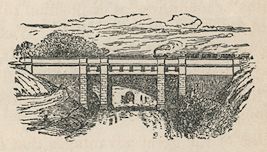
The importance of forming right habits is seen upon a little reflection. The things we do once or twice we are likely to repeat: we are, therefore, always forming habits, good or bad; and children frequently get them as settled as a rail-road track, before they are aware of it. Now, these habits may ruin those who adopt them, and turn into evil the best advantages that they can enjoy.
If a boy gets the habit of studying in a half-way, slovenly, slip-shod manner, he is almost certain to be greatly injured thereby.
-----
p. 100
If he goes to college, he there continues the same habit; when he comes out, he still carries it with him; when he enters upon business, it still hangs about him. He does nothing well, or thoroughly; he is careless and slovenly in all he does; there is imperfection and weakness in his career, and finally he turns out an unsuccessful man. If he is a merchant, he usually fails in business; if a lawyer, a physician, or minister, he is generally at the tail-end of his profession, poor, useless, and despised. such is the mighty influence of our habits! and remember that they are formed in early life: remember that every day feeds and fosters our habits.
It is interesting to trace the way that Washington’s youthful habits operated upon his life. Some of his copy-books are extant, which show how careful he was in learning to write. He took the pains to write out, in a fine hand, the forms in which notes of hand, bills of exchange, receipts, bonds, deeds, wills, should be drawn. Thus he cultivated the habit of writing neatly, of being patient in copying papers, and of being accu-
-----
p. 101
rate in making copies; and at the same time he made himself acquainted with the forms of drawing up business documents. In all this, we see the habit of doing things patiently, accurately, and thoroughly. We see that Washington had so trained himself, that he could cheerfully sit down and do that which was mere toil, and which some boys would thinks stupid drudgery.
There are also several quires of his school-manuscripts remaining on which he worked out questions in arithmetic and mathematics. These manuscripts are very neatly executed; there are several long sums which are nicely done and beautifully arranged. There are, also, extensive columns of figures, all set down with careful precision.
Another thing visible in these manuscripts is, that Washington studied accuracy; his sums were all right. What a beautiful illustration of the great man’s life! His youthful manuscripts show that he learned to render his school-boy pages fair, to work all his sums correctly. Thus he started in life, and thus he became qualified to make the pages of his history glorious.
-----
p. 102
Another thing that had great influence in the formation of Washington’s character, and in securing success in life, was that very early he adopted a code or system of rules of behaviour. This was found among his papers after his death, in his own handwriting, written at the age of thirteen. I will give you a few extracts from this paper.
“Every action in company ought to be with some sign of respect to those present.
Be no flatterer, neither play with any one that delights not to be played with.
Read no letters, books, or papers in company.
Come not near the books or papers of another so as to read them.
Look not over another when he is writing a letter.
Let your countenance in general be cheerful, but in serious matters let it be grave.
Show not yourself glad at another’s misfortune.
Let your discourse with others on matters of business be short.
-----
p. 103
It is good manners to let others speak first.
Strive not with your superiors in argument, but be modest.
When a man does all he can, do not blame him though he succeeds not well.
Take admonitions thankfully.
Be not hasty to believe flying reports to the injury of another.
In your dress be modest, and consult your condition.
Play not the peacock, looking vainly at yourself.
It is better to be alone than in bad company.
Let your conversation be without malice or envy.
Urge not your friend to discover a secret.
Break not a jest where none take pleasure in mirth.
Speak not injurious words either in jest or earnest.
Gaze not on the blemishes of others.
When another speaks, be attentive.
Be not forward to relate news.
-----
p. 104
Be not curious to know the affairs of others.
Speak not evil of the absent.
When you speak of God, let it ever be with reverence.
Labour to keep alive in your heart that spark of heavenly fire called conscience.”
Such are some of the rules by which Washington proposed to regulate his behaviour at the age of thirteen. Most of them turn on one great principle, which is, that you should treat others with respect; that you should be tender of the feelings, and rights, and characters of other;s that you should do to others as you would have others do to you.
But Washington not only laid down good rules and committed them to memory, but he was in the habit of observing them; and he not only observed them when a child, but after he became a man. He got into the habit of obeying every one of these rules, and every one of them became a rail-road track to him, and he therefore followed them;
-----
p. 105
and thus it was that his manners were always so dignified, kind, and noble; thus it was that his character and conduct became so great and good.
Now, I would not have my readers suppose that Washington was always a man; on the contrary, when he was a boy, he loved fun as well as anybody: he liked to run, to leap, to wrestle, and play at games. He had a soldierly turn, even in boyhood, and was fond of heading a troop of boys, and marching them about with a tin-kettle for a drum.
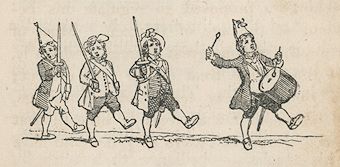
Washington was quick-tempered and passionate when a boy; but the beauty of his history in this point is, that by adopting good habits and principles he overcame this tendency of his nature, and he showed that all quick-tempered boys can do the same, if they
-----
p. 106
please: they can govern their tempers; they can adopt good rules of conduct; they can get into the habit of being calm, patient, and just.
There are many other traits of character belonging to Washington that are interesting and worthy of imitation. He was accurate and just in all his dealings; he was punctual in the performance of promises; he was a man of prayer, and an observer of the Sabbath. And the point here to be noticed by youth, is, that all these qualities which we have been noticing, were the fruit of seed sown in his youth. They appear all to have taken root in one great principle—OBEDIENCE—obedience to his mother, obedience to his teachers—obedience to a sense of duty, formed into habit in early life. This was the real source of Washington’s greatness. He was not made greater or better than are many others, but he adopted good habits, and under their influence he became great. The actual greatness of Washington in life arose more from the good use he made of his faculties than from any original superiority of those faculties.
-----
p. 107
Another thing to be observed is, that in adopting good habits, Washington rejected bad ones. He was guilty of no profanity, no rudeness or harshness of speech; he was not addicted to sprees; he was no haunter of bar-rooms or taverns; he had no vulgar love of eccentricity; he affected not that kind of smartness which displays itself in irregularity or excess; he did not think it clever to disobey teachers or parents; he was no lover of scandal, or of profane and rude society. Perhaps one of the most remarkable characteristics of Washington was his complete power over himself; the entire subjection of his feelings, and passions, and desires, to his judgment, to his sense of right.
The teaching, then, of Washington’s example is this:—study obedience, patience, industry, accuracy, neatness, order, method, respect to the rights and feelings of others: make these things habitual rail-tracks in the mind. The course of obedience is the path to glory; that of disobedience is the path of failure and disappointment in the race of life.
-----
[p. 108]
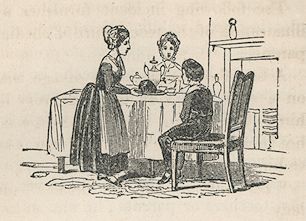
CHAPTER XXIII.
OBEDIENCE.
The first laws which we are required to observe are those given by parents: and we ought to obey them, because our parents are wiser than we, and know best what is good for us; because the harmony of the family circle requires our obedience; because we owe gratitude to our parents; because God has commanded us to obey them; and because it is necessary to form in our hearts the habit of submitting to rules and laws. A person who has never learned obedience has not yet taken the first step in the path of virtue.
-----
p. 109
The following incident furnishes a good illustration of the true nature of obedience to parents:
A boy about seven years of age was once on a visit to a lady who was very fond of him. One day at breakfast there was some hot bread upon the table; and it was handed to him, but he would not take it.
“Do you not like hot bread?” said the lady.
“Yes, I like it very much, ma’am.”
“Then, my dear, why do you not take some?”
“Because my father does not wish me to eat hot bread.”
“But your father is a great way off, and will not know whether you eat it or not. You may take it for once; there will be no harm in that.”
“No, ma’am, I will not disobey my father and mother. I must do what they have told me to do, although they are a great way off. I would not touch it if I were sure nobody would see me. I myself should know it, and that would be enough to make me unhappy.”
-----
p. 110
The Story of Ben and Tim.
There are some little boys, and little girls too, some with black eyes and some with blue, who remember a great deal better what their parents tell their brothers and sisters, than what is told to themselves. Once upon a time there were two boys, one named Benjamin, and the other Timothy, but called Ben and Tim, whose story will afford a good instance of what I refer to.
They were nice little boys, and about as good as children in general; and they loved their mother very much; but still, they did a good many mischievous things, that gave her trouble. She had a neat little garden, and in it were some pretty flowers, especially some red roses, which were very beautiful.
Now these two boys picked some of these roses, and, as their mother wished to keep them, she told them both not to pick any more. Well, for a day or two they obeyed; but at last little Ben, who was the eldest, saw a beautiful little rose, and it looked so pretty, he yielded to temptation, and plucked it. Tim saw him, and he plucked one too.
-----
p. 111
They said nothing about it, for a time; but the next day little Ben, who was very fond of telling tales, made known the story, so far as Tim was concerned. “Mother,” said he, “did not you tell Tim that he was not to pick any more roses?”
“Yes, I did,” said the mother.
“Well, he did pick one yesterday.”
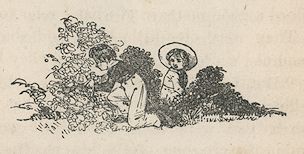
“I did not,” said Tim.
“I say you did!” said little Ben.
“I say I did not!” said Tim.
“Oh, mother, he did, for I saw him pick it: it was a beautiful red rose; and when he had picked it, he smelt it; and then pulled it to pieces.”
Here Tim began to cry. “Well,” said he, “you picked one too!”
-----
p. 112
“Oh!” said Ben.
“I say you did; you picked one first, and if you had not picked one I should not.”
Here Ben began to cry. “I see how it is,” said the mother. “It is too often so, my dear Ben; it is too often so. You remember very well what I tell Tim, but you forget what I tell you. Now I forbade you both to pick the roses, and it seems you were the first to disobey; and in this you were more to blame than Tim, for you led the way to disobedeince, and thus, by a bad example, made Tim disobey also.”
“But, what is worse than all, your love of telling tales induced you to tell of Tim, when you were more to blame yourself. This is very wrong; for as you are the elder you ought rther to shield your little brother from blame than to bring it upon him.”
Poor Ben was in tears, and his little heart was very sad, and he could not be comforted till his mother forgave him, and took him to her bosom, and said she hoped he would never do so again. this he promised, and then he brightened up, and the two children went to their play.
-----
p. 113
Now I suppose that Ben was really sorry for his fault, and no doubt his promise not to do so again was very sincere; but when once a child has got a bad habit, it is very hard to get rid of it. It was, therefore, a long time before he could remember what was said to him, better than what was said to his brother Tim. He, however, mastered this difficulty, and at last, when his mother laid her commands upon him, he was sure to take them to heart, and obey them.
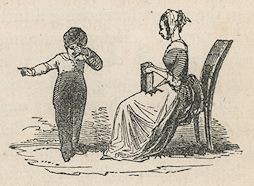
Now I recommend it to all blue-eyed, and black-eyed, and gray-eyed children, to think of this little story, and to take care that they remember better what their parents tell them, than what they tell any one else.
-----
[p. 114]
CHAPTER XXIV.
HOW TO SETTLE A DISPUTE.
“The first thing,” says [sic] the old cookery-books in the recipe for cooking a turbot, “is to catch a turbot.” Before you enter upon a discussion, settle it clearly in your mind, what it is you propose to discuss. How many vain disputes, how many angry controversies would be prevented, if the parties would start with a definition,—if, before beginning to cook a turbot, they would catch a turbot.
Some few years since, an American gentleman, who did not understand the French language, being in Paris, wished to go to Bourdeaux. Accordingly he went down to the diligence office, and making such inquiries as he was able, paid his fare, entered the diligence, and set off, as he supposed, for Bourdeaux. Four days and four nights he
-----
p. 115
travelled very patiently, not dreaming that he wass in the wrong coach.
At last he reached the termination of his journey, and having taken a long night’s repose, he dressed himself carefully, selected his letters of introduction, and, calling the waiter, showed him the inscriptions of these letters, and intimated that he wished to go to the persons to whom they were addressed.
The man stared in the traveller’s face, and uttered a good deal of incomprehensible French. The American talked English, but all to no purpose. At last the waiter left the traveller in despair, and called his master. He was as much puzzled as the servant, and finally, as the only resort, sent out for an Englishman living in the town, to come and see an American gentleman who was out of his mind.
The Englishman came, and the American stated his grievance. “Here,” said he, showing his letters, “are some letters of introduction to several gentlemen in this city, and I want these stupid people to take me to them: but they only gaze in my face,
-----
p. 116
shrug their shoulders, and make unmeaning explanations.”
The Englishman stared at the American, as if he, too, thought him out of his mind. At last he said to him, “Sir, these letters are addressed to gentlemen in Bourdeaux: where do you suppose you are?”
“In Bourdeaux, to be sure,” said the American.
“Not so,” said the Englishman: “you are in the city of Lyons, 700 miles from Bourdeaux.” The simple explanation of the whole scene was, that the traveller had entered the wrong coach, and instead of proceeding to Bourdeaux, had gone 400 miles in the opposite direction. This story shows the importance of looking well to the outset of a journey; or, if you please, to the commencement of a discourse, or a dispute. In the one case, be sure to enter the right coach; in the other, start with a clear understanding.
If, unluckily, you should by any chance get into a dispute, the best way is to stop short, and ask your antagonist to enter into a consideration of what the point of debate is. This is apt to have a cooling effect upon both
-----
p. 117
parties, to result in a clear understanding of the real question.
A few years since, I happened to be travelling in a stage-coach, where, among half a dozen passengers, there were a Frenchman and an Englishman. There seemed to be a sort of cat-and-dog feeling between them; for if one opened his lips to speak, the other was sure to fly at the observation with the teeth and claws of dispute. As we were driving along, the Englishman spoke of a sheep he had seen in some foreign land, with a tail so long as to drag upon the ground. Thereupon, the Frenchman shrugged his shoulders, curled up his lip, lifted his eyebrows, and took a pinch of snuff.
“What do you mean by that?” said the Englishman, not a little nettled at the contemptuous air of his rival.
“Vat do I mean?” said the latter; “I means dat a sheap has not got von tail at all.”
“A sheep has not got a tail, ha?” said the Englishman.
“No, not von bit,” said the Frenchman.
“Well, this comes of eating frogs,” said
-----
p. 118
the John Bull. “What can you expect of a man who eats frogs? You say a sheep has not got a tail. I tell you, mounseer, a sheep has got a tail.”
“Pardon, monsieur,” said the other, with a polite bow, yet with a very sneering expression; “you say de sheap has von tail: I say de sheap has no tail, not von bit.”
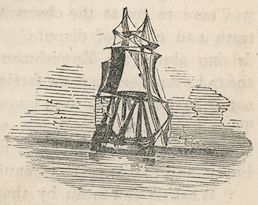
By this time the parties were greatly excited, and I cannot say what might have happened, had not one of the passengers asked the Frenchman what he meant by a “sheap?”
“Vat I mean by sheap? vy I means von big larsh ting, with sails and rudder, that go upon de sea.”
“Oh ho!” said the Englishman, “you mean a ship.”
“Oui monsieur,” was the reply; “I
-----
p. 119
mean von sheap, that has de captain and de sailors, and goes on de vater.”
“Very well,” said the Englishman: “I meant a sheep, a creature with four legs, and covered with wool.”
“Ah, you mean von sheap vit de vool!” said the other; “oh, oui, monsieur; de sheap vit de vool has de tail. Oui, oui.”
This incident taught me a lesson, and I give it to my readers;—if they ever get into a controversy, let them consider whether one of the parties does not mean a SHIP, and the other a SHEEP.
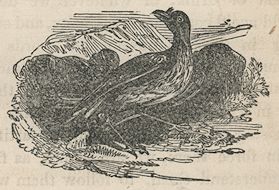
-----
[p. 120]
CHAPTER XXV.
POLITENESS.
This is doing to others as we would have others do to us, in the familiar intercourse of life. Politeness is, therefore, not only a mark of refinement, of good breeding, but it is a duty. It consists in paying a deference to the feelings of others, in trifles; whether we eat or drink, or whatever we do, we should avoid coarseness, vulgarity, and everything in looks, movements, words and actions, that may offend those around us. We should adopt the best manners of the society in which we live; if certain rules, even supposing them to be arbitrary or artificial, are in force there, we are bound, as far as we understand them, to follow them whenever they are not wrong.
There is no surer mark of a coarse and ill-regulated mind, than a refusal to observe
-----
p. 121
the courtesies, civilities, and decent ceremonies of the society in which a person lives. All these are soon learned, and there is no excuse for their neglect.
Politeness forbids rude words, rude looks, and everything that betokens a lack of respect to the company present: politeness would carry the gentle and kind spirit of christianity [sic] into all the intercourse of society. Let no one, who would desire the character of a Christian lady, or a Christian gentleman, or a Christian at all, refuse to practise politeness. A person is as much bound to be just in little matters as in great matters; and he who will offend in things of taste, feeling, and decency, is very likely to offend in the weightier matters of the law. Can a man who sins in pence be honest in pounds?
There is no greater mistake than to suppose that politeness means hypocrisy, or that bluntness means sincerity. Why should a delicate regard to the feelings of others, a desire to be merciful and just, even in those invisible things which can only be weighed in the delicate balance of the bosom, be
-----
p. 122
called duplicity? Why should the rough, careless, footstep trampling upon roses, be thought to display an honest regard to the proprietor of the garden? No, no, bluntness is vulgarity, call it what we may; and though politeness may be adopted as the hypocrite’s mask, it is because he knows it to be a virtue, and would assume its image and superscription.
There is nothing which does more to degrade a person than to forget his breeding, to be tempted by a flaw of ill-humour into some rude, offensive, or insulting look, word or action. When once politeness is put on, and the character of the lady or the gentleman is assumed, like the armour of the ancient knight, it is ever to be worn, and ever to be kept bright. If you meet with a person who is sometimes polite, and sometimes rude, you may safely set him down as a sham gentleman or a sham lady, as the case may be.
One serious thing have I to say to my friends of the sterner sex; a man who will on any occasion be guilty of a breach of politeness to one of the gentler portion of
-----
p. 123
our species is no gentleman, but a dastardly counterfeit. The position of woman, the character of woman, give her an inviolable claim to that protection which the encircling boundaries of politeness are calculated to afford; and he who breaks them down, or overleaps them, is a cowardly trespasser.
The Mouth.
The mouth was made to eat and speak with. It is therefore a convenient and useful thing, and we could not do without it.
But the mouth, like almost everything else, needs to be taken care of. Sometimes the mouth will pout, and make a person look very disagreeable.
Sometimes the mouth will eat very fast, and get too much in at a time. Do not let your mouth do any such things as these!
I had almost forgotten to tell you another very curious thing about the mouth, and that is, that it laughs. I believe dogs, and cats, and pigs, and hens, and geese, never laugh; but children laugh, and old people too, sometimes.
-----
p. 124
It is well enough to laugh, at proper times. I love to see children laugh in their play. I love to see them laugh when I tell an amusing story.
But I never like to see any one laugh at the misfortune or fault of another. Tell me, reader, did your mouth ever laugh at another child because he was poor? or because he was poorly dressed? or because he fell down and hurt himself? or because he happened to know less than you do?
If your mouth has ever done any of these naughty things, I pray you, teach your mouth better manners.
The Tongue.
Every one has in his mouth a thing to talk with, called the tongue. This is made to tell the truth with. When the tongue tells a lie, it does that which is very wrong.
The tongue is made to say kind and pleasant things to our friends. When it says a saucy thing to anybody, it is a naughty tongue.
When the tongue says a disobedient word
-----
p. 125
to a father or mother, it is a wicked tongue. When it says an unkind word to a brother or sister, it is a very bad tongue indeed.
When the tongue swears, it does that which God has expressly forbidden.
When the tongue speaks bad words, it is a vile tongue. What boy or girl would like to carry about such a tongue in his mouth?
Now, my young reader, let me ask you a few questions. What sort of a tongue have you? Does it always speak the truth? does that tongue of your ever say saucy words?
Does your tongue ever say disobedient words to your parents? does it ever say unkind words to a brother or a sister? does it ever swear? does it ever utter vile words?
O, my friend, if your tongue ever does anything wrong, what shall be done? Can you tell me how to correct an evil tongue? I can tell you. Take care of your heart and think right thoughts, and you will be sure to speak right words.
-----
p. 126

The Hand.
Every limb and member of the body is made for some good purpose.
The eye is made to see with; the ear is made to hear with; the nose is made to smell with; the mouth is made to eat and speak with.
The feet are made to run and walk with; the hands are made to work with, to write with, and to do many other things.
But do you think children’s hands were ever made to strike their brothers, or sisters, or playmates? Were your hands ever made to snatch away things from each other?
Who gave you hands? God gave them to you. Did he give you hands to steal with? Did God give you hands that you might throw stones at geese, or dogs, or hens, or cows, or any other innocent animals?
-----
p. 127
Did God give you hands to injure or wound any of the creatures he has made?
Take care of your hands, then, my children! Take care that the hands which God has given, do nothing that God disapproves.
Dress.
There is nothing in which mankind display more caprice, than in dress; and it is curious to remark, that this caprice is most conspicuous in the more civilized countries. In London and Paris, the fashions of dress change every year, and in some things, every few weeks. There is a new style of bonnet in Paris almost every month.
But in China and India, and indeed over all Asia, the fashions of dress are unchangeable. The people now wear almost exactly the same garments, of the same colours and the same forms, as were in use a thousand years ago. The Chinese gentleman of our day probably has almost the same appearance as one of the age of Confucius.
The country people of Europe, generally,
-----
p. 128
have a fixed costume, which continues, with little change, from generation to generation; but in the great cities, all is variety and vicissitude. In America we copy European fashions, and there are some silly people whose greatest desire is to be dressed in the Parisian style.
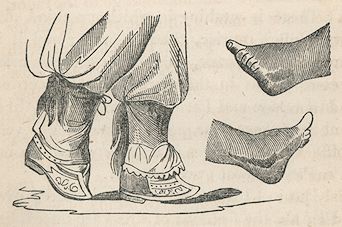
Now when we are told of the Chinese ladies, who have their feet bandaged in order to make them small, until they can hardly walk,—thus rendering themselves miserable and useless, and all this to be thought genteel,—we think them very absurd. Yet tell
-----
p. 129
me, do you not think some of our ladies are about as foolish?
But we must not laugh at the ladies only, for the other sex deserve a share of our notice. Foppery is not confined to any country. A young savage of the western woods has often the ambition to figure as a gay fellow, as well as the New York or Boston dandy. He does not go to the tailor, to be made a man of, but he relies upon his own skill. He paints himself over with clay, of various colours, mixed with bears’ grease. One side of his face is made blue, and another yellow. On his breast, a serpent is figured; on his back, a buffalo or a wolf. On his head, he wears the features of an eagle; around his neck, the claws of the grisly [sic] bear; on his back is a bundle of scalps, and on his arms the skin of a polecat. Over his shoulder is a buffalo-robe decorated with a frill of quills, and ornamented with beads. Such is your dandy of savage life.
But, as we are not writing an article on the fashions, it is our duty only to lay down a few simple rules touching this affair of dress. Without enlarging upon the subject,
-----
p. 130
I may embrace what I have to say in the five following suggestions:
1. Dress according to your condition.
2. Avoid singularity in dress.
3. Neatness and cleanliness are indispensable. Even the finest and most costly things, as Brussels lace, soiled and tumbled, would fail to please, and may be compared to ill flavoured custards or other delicacies.
4. That dress is best which is least remarked; which makes the person appear well, without provoking the observation—“he or she is finely dressed.” When the dress is remarked for beauty, and the person for ugliness, the toilette is ill performed.
5. What is fashionable, is not always right.
The Sparrow and Robin.
A robin was one summer evening sitting upon a tree and singing its cheerful song right merrily. A critical sparrow was near by, and when the robin had done, he exclaimed, “What a miserable song! Why, it really seemed as if it would split my ears. How can you, robin, pretend to sing, when
-----
p. 131
there are those around who understand music so much better?”
“Why, dear sparrow,” said the robin, “I only sing simple songs, such as nature has taught me; and here is my pretty mate at my side, and she says my song gives her pleasure.”
“The more fool she,” said the sparrow, smartly, “to be captivated with such humdrum stuff. If you want to hear music, you must listen to the catbird,* who has been to foreign countries, and the macaws, that are dressed so fine. They have introduced a new style of music, and it is all the fashion; and your lackadaisical songs are now out of vogue, and none but the vulgar can bear them.”
“Very well, if it be so,” said the robin quietly. “I know my songs are of a very humble kind, but they are still pleasing to me and mine; and I doubt not that my simple melodies give more true pleasure than the more fashionable airs of these foreign minstrels. One thing proves it, and that is this:
*The catbird is a noisy American songster, much given to imitating other birds.
-----
p. 132
when any one of the birds sings our ‘native wood-notes wild,’ there is a silence all around, and every one has a look of delight. But when one of the fashionable musicians is singing, though the birds roll up their eyes and say, ‘exquisite!’ and ‘enchanting!’ and all that, they look, all the time, as if they were in the greatest distress. It seems to me very silly for people to praise a thing they dislike or do not understand, merely because it has come into fashion.”
This fable may show, that what is merely fashionable may be, and often is, praised by a certain set of people; but that most persons prefer what is simple and natural, and founded in nature and good taste.
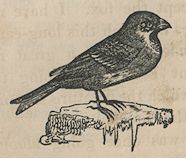
-----
[p. 133]
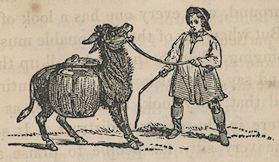
CHAPTER XXVI.
BOASTING.
I can hardly tell the reason, but the fact seems to be, that the ass, an honest and somewhat stupid animal, appears to have given rise to more fables than any other beast, except the fox. I have myself told some fables in which this long-eared personage is made to utter a great many wise things, but I am now going to tell two fables, in which the creature is represented as talking rather foolishly.
A man was once going along the road with an ass, whom he treated somewhat roughly, upon which the beast first whisked
-----
p. 134
his long tail, and then groaned, and finally spoke outright. “It seems to me, sir,” said the honest creature, “that you use me very ill, particularly as I belong to a race of great antiquity, and one that has been honoured above all four-footed beasts!”
“Why, how is that?[”] said the man.
“How is that? indeed!” said the ass. “If you had read the bible as much as you ought to have done, you would remember that it was one of my ancestors which conversed with a prophet, and stood in the presence of an angel on a certain occasion. This is an honour which belongs exclusively to the ass family, of which I am one, and therefore it seems meet that you should treat me with proper respect.”
“Well done!” said the countryman; “well done! poor brute. This is ever the way. It seems to be with asses as with men: when one has no merit of his own, he always boasts of the dignity of his family, or the virtues of his ancestors. For my part, I know of nothing that sings a beast or a man lower, than to see him attempt to cover up his own vices, or weakness, or folly, by
-----
p. 135
showing off the dignity of his pedigree, or the respectability of his connections.” Then, giving the ass a somewhat contemptuous push, the man passed on.
The Lion and the Ass.
An ass was one day travelling with a lion who wanted the assistance of his bray in frightening the animals he was hunting. The ass felt very proud of his company, and did not like to speak to his old acquaintances.
As they were travelling along in this manner, the ass met an old friend, of his own race, who very civilly bade him a good morning. The ass started back with a stare, and said, “really, you are very impudent; I do not know you!”
“Why not?” replied his friend: “because you are in company with a lion, are you any better than I am,—anything more than an ass?”
Those narrow-minded people, who, in prosperity, forget the friends of their humbler days, are about as wise as the ass in the fable.
-----
[p. 136]
CHAPTER XXVII.
WEAKNESS OF CHARACTER.
There is a beautiful story in the fifth chapter of the second Book of Kings, about a famous person named Naaman. He was captain of the army of the king of Syria, and was a great and mighty man.
But he was afflicted with a loathsome disease, called leprosy, which is common in the eastern countries. Now the Syrians had gone to war, and had brought away from the land of Israel a young maiden as a captive, and she waited on Naaman’s wife. The story in the Bible goes on as follows:
“And she said unto her mistress, Would to God my lord were with the prophet that is in Samaria, for he would cure him of his leprosy. And one went in and told his lord, saying, Thus and thus said the maid that is of the land of Israel. And the king of Syria
-----
p. 137
said, Go to, go, and I will send a letter unto the king of Israel. And he departed, and took with him ten talents of silver, and six thousand pieces of gold, and ten changes of raiment. And he brought the letter to the king of Israel, saying, Now, when this letter is come unto thee, behold, I have therewith sent Naaman my servant to thee, that thou mayest recover him of his leprosy. And it came to pass, when the king of Israel had read the letter, that he rent his clothes, and said, Am I God, to kill and to make alive, that this man doth send unto me to recover a man of his leprosy? wherefore consider, I pray you, and see how he seeketh a quarrel against me.
“And it was so, when Elisha, the man of god, had heard that the king of Israel had rent his clothes, that he sent to the king, saying, Wherefore hast thou rent thy clothes? let him come now to me, and he shall know that there is a prophet in Israel. So Naaman came with hishorses and with his chariot, and stood at the door of the house of Elisha. And Elisha sent a messenger unto him, saying, go and wash in Jordan seven times,
-----
p. 138
and thy flesh shall come again unto thee, and thou shalt be clean. But Naaman was wroth, and went away, and said, Behold, I thought, he would surely come out to me, and stand, and call on the name of the Lord his God, and strike his hand over the place, and recover the leper. Are not Abana and Pharpar, rivers of Damascus, better than all the waters of Israel? may I not wash in them, and be clean? So he turned, and went away in a rage.”
Now this beautiful story may afford instruction to young people of our time; for, like the Syrian captain, we all of us like to do things in our own way; and furthermore, we like to perform certain duties rather than others.
The truth is this, that in almost all our conduct, we permit our pride, our likes and dislikes, our tastes and aversions to govern us, rather than our sense of duty. we very seldom ask ourselves “what ought I to do and how ought I to do it?” implicitly and cheeerfully acting according to the reply which conscience gives. even those who mean to be governed by duty, are very apt
-----
p. 139
to look over their list of duties, pick out those which are most agreeable, and perform them, neglecting or delaying all others; and even in performing duties, we are likely to do them in the way most agreeable to ourselves, and often not in the best way.
Now all this is weakness and folly: it is real and practical disobedience; it shows that the heart is not right, that we are selfish, self-willed, self-seeking, rather than honest, sincere, faithful followers of duty.
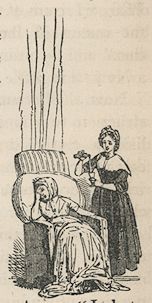
Let us suppose a case. Anna is sick, and her mother wishes her to take some medicine, and proposes that she shall take castor oil.
“Oh, mother,” observes Anna, “I hate castor oil.”
“So does everybody,” says the mother. “But is it not better, my dear child, to take a little disagreeable physic than to continue sick, and run the risk of having a fever?”
-----
p. 140
“But, mother, will not something else do as well?” is the reply.
“No, not as well,” says the mother, “the best thing for you is castor-oil; and sick or well, it is always right to do the best thing we can.”
“Oh, mother,” retorts the thoughtless child, “I cannot take castor-oil; anything but castor-oil; but really I cannot take that.”
Now this little girl is very much like Naaman. She wants to get well, but she wishes to do it in her own way. She dislikes castor-oil particularly, and really feels willing to take the risk of being very sick, rather than to swallow a little medicine which disgusts her. So it was with Naaman: he wished to get well, and he was willing to take a bath, but he was a proud man, and he did not like the idea of giving a preference to a river of Judea over the beautiful rivers of Damascus; and so he refused, and went away in a rage.
Thus it is that the little, as well as the great, are very apt to find some difficulty in the performance of duty, even where it would
-----
p. 141
benefit themselves. Almost every person finds something, every day of his life, which he cannot, or rather which he will not do, but which at the same time he ought to do.
Now this is a very important matter; and the reason is this, that if we cannot do the right thing at the right time, and in the right way, though we may be very active, industrious, and energetic, still we shall find ourselves really weak, inefficient and unsuccessful in life.
But how shall we cure such a fault as this, if we happen to have it? I will tell you. Watch yourselves carefully, and when you find yourselves saying mentally, “That thing I cannot do:” consider whether it be a duty, and if it be so, do it immediately, and do it as it ought to be done. Remember that when Naaman repented of his folly, and bathed in Jordan he was healed.
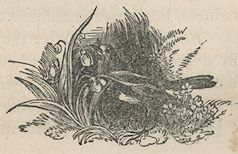
-----
[p. 142]
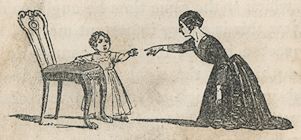
CHAPTER XXVIII.
SELF-RELIANCE—PERSEVERANCE.
Let the distrustful man look about him, and watch the progress of children learning to walk, or to run, to swim, or to ride; then let him lift up his eyes and watch the progress of all beginners in business, the vast business of life. Beginners are always timid; yet, in business, beginners are almost always successful. And it is mostly after they have become in a degree successful, when they have enlarged their business, when they have lost their timidity and become over-confident in themselves, or presumptuous,
-----
p. 143
that their credit is questioned, and their downfal[l] foretold and expected.
Watch their progress nevertheless, and as they cure themselves of their timidity, do you cure yourself of yours.
The rash child begins to run too early, and gets beaten into a more just opinion of himself. He is soon cured. But though cured, he is by no means sure of beating the timid, self-distrustful child in the long run. Mere animal courage is almost worthless. The courage of the soul is what is to be depended upon. And what is the courage of the soul? It is a fixed and holy confidence in God.
The timid child, instead of rising up from his little stool, and walking off at once, to be caught by his mother, sits still and trembles and whimpers, or faces about and drops down by little and little, and for a long time cannot be coaxed into trusting himself. But watch him, and by and by you find him holding on a chair, then standing alone, then trying to walk, led by both hands, then by a single finger. Study him well, and remember the lesson. Or watch the sailor-boy
-----
p. 144
when he first goes aloft, how timidly the bravest feel their way, how bravely the most timid mount the dizzy mast after awhile! And then, which is the better sailor, will depend not so much upon their animal courage, as upon their common sense, and their habit of reasoning with themselves.
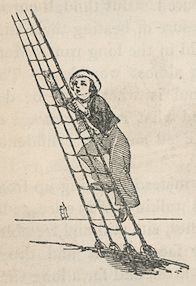
The first plunges at once, and would he persevere, and think, and reason with himself, he would keep ahead all his life; but he seldom does, and for that reason is often outstripped by the self-distrustful but persevering. The second feels his way, gathers confidence, and by little and little begins to overlook danger, to forget himself, and to see nothing but one great object before him, duty.
Take another example. A five-barred gate is before you. You are on horseback,
-----
p. 145
and have a pretty good seat, but for the world you would not venture to take such a leap! Yet others, no more accustomed to leaping than yourself, ride at the gate; and while some clear it with a triumphant cheer, others are left in the mud. If you are timid and self-distrustful, what should be your course? You are urged to try, you are told there is no danger,—what others have done you can do. Do not believe a word of it. With your present feelings, if you try you will be sure either to stick by the way and spoil your horse, to pull him over backwards upon yourself, or to break your neck. What, then, should you do? Either go to a riding-school, or betake yourself to an open field, and practise by yourself, or with a
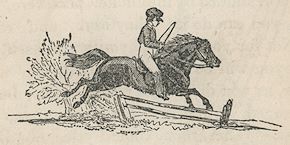
-----
p. 146
friend, beginning at one bar, then trying at two, three, four, and finally at five, if you think it seriously worth your while, and know your horse[.]
Perhaps you are learning to swim. People about you are jumping off from high places; or diving, head first, with their legs straight and feet close together. You would give the world to be able to do it. But you are surrounded by injudicious friends. “Try, try, you can do it!” they say.
Not for your life: if you are self-distrustful, you will be sure to fall flat, or to turn over, as you dive, and pretty sure to be discouraged, or stopped for ever in your progress. What, then, should you do? Begin moderately: go where you know you are safe. Do what you know yu can do, for that you will do boldly, and that will givew you confidence. One thing at a time, and but one. Begin as a little child: be teachable and patient. And mark me, if you are faithful to yourself, you may be sure of outstripping the over-confident in the long ru.
Do you know that Curran, the great orator,
-----
p. 147
broke down in his first speech, and, as some said, made a fool of himself? It is often the case that a man whose first speech is wonderful never makes another worth listening to: of such men there is little hope. Do you know that Frederick the Great ran away in his first battle? It is said, and it is not unlikely, that the Duke of Wellington showed the white feather in India! Have you ever heard the story of two young officers who were sent, under Wellington’s own eye, to make a charge upon a body of French cavalry in Spain? As they rode together, one grew pale, trembled, and his feet shook in his
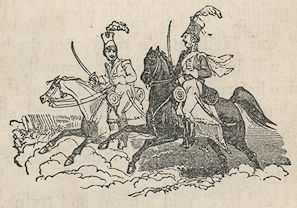
-----
p. 148
stirrups. His companion, a fine, bold fellow, observed it, and reproached him. “You are afraid,” said he. “That is very true,” said the other, “I am afraid; and if you were half as much afraid as I am, you would turn your horse’s head and ride back to the camp.” As they had not advanced far, the other, indignant, returned to Wellington to tell the story, and to ask for a worthier companion. “Cllap spurs to your horse, sir,” was wellington’s reply, “or the business will be done by your cowardly companion before you get there.” He was right: the business was done; the coward swept down upon the enemy like a whirlwind, and scattered them like chaff. Which of these two was the braver man?
“I will try,” said Miller; and trying, he did what an over-confident man would have promised to do, but might have failed in performing.
So with all the business of life. Try, try, keep trying. You will most assuredly succeed at last, if you persist. And if you do not succeed, it is not your fault.
Begin cautiously, as cautiously as you
-----
p. 149
please. Try your strength by little and little, and after a few years, not months, nor days, but years, you will be astonished at your progress, and be cured of your self-distrust.
Persevere.—Think well before you begin. But having once begun, persevere through good report and through evil report, and you shall have your reward.
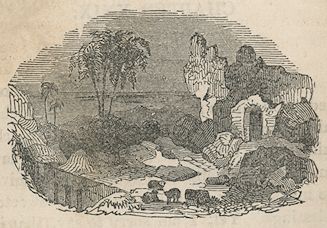
-----
[p. 150]
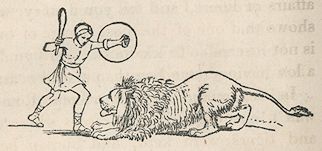
CHAPTER XXIX.
GRATITUDE.
Gratitude is the feeling which acknowledges kindness: it is a sentiment, which is alike agreeable to him who exercises it, and him who is the object of it. It is a source of much of the happiness of life, and is given to mankind by God, as one of the sweetest blessings. Yet, I am sorry to say, that ingratitude is not uncommon: there are those who refuse to acknowledge kindness which they have received. This exhibits a shocking state of heart, and perhaps displays more
-----
p. 151
meanness and turpitude than almost any other single fice. Let my readers beware how they indulge it, even in the most trifling affairs of life. I will tell you a story, which shows that one of the most savage of brutes is not insensible to kindness. Will you take a lower moral standing than a wild beast?
In the famous days of ancient Rome, it was a custom to have a circus where lions and tigers were kkept, and human beings were thrown into them and devoured, in punishment of offences they ahd committed agains the government. The exhibition of these bloody scenes was one of the favorite public amusements of the Romans.
It chanced that upon a certain time a slave, by the name of Androcles, had escaped and fled to the forests of Africa. He took refuge in a cave where he found a lion, which having got a thorn in his foot, was in great agony from the swelling and festering of the wound. Androcles extracted the thorn, and dressed the wound, and the lion and he parted.
After some years Androcles, venturing back to Rome, was seized, and condemned
-----
p. 152
to be thrown into the circus, where a large and fierce lion, just brought from the wilds of Africa, was in readiness to devour him. There was a large audience to witness the scene; judge of the surprise of all present, when the lion which rushed upon Androcles at first, no sooner put his paws upon him, than his rage abated, and he crouched fawning at his feet! It was the very lion whose wounded foot Androcles had healed. The lion knew his benefactor, and displayed his gratitude. Alas, alas! this untutored savage of the forest shoved a better feeling than has sometimes been exhibited by human beings toward their benefactors, even in cases where they have enjoyed the light of Christianity.
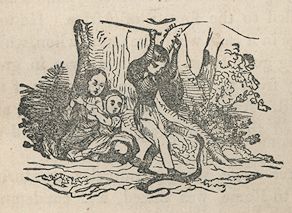
-----
[p. 153]
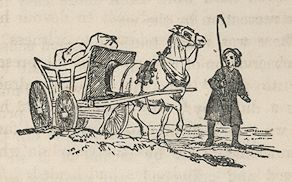
CHAPTER XXX.
AMUSEMENT.
A waggoner, whose business it was to transport goods from one town to another, had a fine horse, upon whose saddle he was accustomed to carry several bells, which kept up a cheerful jingling as he trudged along the road. the horse got used to these bells, and was so much pleased with them, that he seemed dull and out of spirits when, for some reason, they were left off. The waggoner, perceiving that his horse did not work so well without the bells, restored them to their place, remarking that his horse was
-----
p. 154
like himself, he liked music and merriment, and even hard work came more easy for a little recreation by the way.
There was much truth and good sense in the observation of the waggoner. “All work and no play,” says the proverb, “makes Jack a dull boy.” It is right and proper that we should devote some part of our time to amusement, for by means of it we are cheered and enlivened, and qualified to engaged in our severer duties with good effect. But we should be careful of two points: first, that we choose innocent amusements; and second, that we do not permit our recreations so far to engross our thoughts or our time, as to interfere with the sober business of life.
The Lion and the Mouse.
A lion was once going to war; he had buckled on his sword, and gathered his forces, and, with the monkey and the bear supporting his long robe behind, he was proudly marching over the plain at the head of his army. As he was proceeding, it
-----
p. 155
chanced that his majesty encountered a mouse, dancing merrily over the ground. The kind paused, and observed the little dancer with a grim smile of satisfaction. At this the bear grumbled, and the monkey sneered, for his majesty being in a warlike humour, they thought it meet that everybody else should be so too: but they were both speedily silenced by the lion, who spoke as follows:
“why do you grumble at this pretty little felloow? See how graceful his movements are, and how cheerful is his countenance! Remember that everything has its use, and nothing is more useful than that which makes us cheerful, provided it is innocent. Even we warriors have need of cheerful excitement, for by this means we are better fitted to discharge our solemn duties. Let us not despise, then, even such sports and trifles as come in our way, provided always that they are as harmless as the frisks and frolics of this little dancing-master of the meadow; and provided, too, that we never neglect business for pleasure.”
-----
[p. 156]
CHAPTER XXXI.
DO NOT BE TOO POSITIVE.
There are many young persons who are very positive even when they are mistaken.
“There goes Jerry Smith,” said Philip.
“Where? I do not see him,” said John.
“Why, yonder, at the top of the hill.”
“Oh, that is not Jerry Smith!”
“Yes it is.”
“No it is not; it is Seth Mead.”
“I tell you it is Jerry Smith; if it is not I will eat him.”
Such is the dialogue, but pretty soon the boy comes along; and behold! it is Seth Mead, and not Jerry Smith.
“There!” says john, “now you must eat him, Phil.”
“Where is the hammer, Peter?” says his father.
-----
p. 157
“I do not know, sir,” is the reply.
“But you had it last.”
“No, I had not, sir.”
“Yes, you had; you took it yesterday.”
“Oh, yes, I remember; I took it; but I put it in the drawer again, where I took it from.”
“Are you sure?”
“Yes, sir.”
“I think you are mistaken; for if you had put it there, it would have been there still.”
“I am certain I put it back.”
“Well now, my son, I found it out on the grass, where you had been at work. Did you not leave it there?”
“Oh, yes, I believe I did! Yes, I remember, I did leave it there.”
“Well, now take a lesson from this; do not be so positive, when you are not sure. In two instances you have been mistaken: you first said that you had not taken the hammer out, and you were quite positive; you then said you had put it where you got it from, and you were again quite positive. But remember that in both cases you were
-----
p. 158
mistaken. Let this teach you to be more modest and careful in future; and, instead of saying you are sure, say, I think so and so; or, I believe so and so. No person ought ever to say that he is positive of a thing, when there is the least chance of mistake.”
“Mamma,” said Ellen, “may I go and see Jane Hanson? she asked me to come.”
“When did she ask you?” said her mamma.
“Yesterday, yesterday afternoon.”
“Not yesterday, my dear.”
“Yes it was yesterday, mamma: I saw her on the green by the church.”
“Do not be positive, Ellen; it could not have been yesterday.”
“Yes it was yesterday; I am certain it was yesterday; I met her on the green, and she asked me to come. Why, mamma, how could I be mistaken? I know it was yesterday.”
“That cannot be, Ellen, for I have just been at Mrs. Hanson’s; and Jane went to Providence in the coach, which set out at seven, yesterday morning.”
-----
p. 159
“Oh! well, it must have been the day before yesterday; yes, now I recollect, it was the day before yesterday!”
“Well, my child, I am sorry to see you so positive, when you are really not sure, and when, in point of fact, you are mistaken. Pray be more careful in future. You may go to see Jane, but as you go along, say it over in your mind, till you cannot forget it, Do not be too positive.”
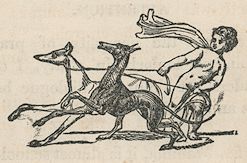
-----
[p. 160]
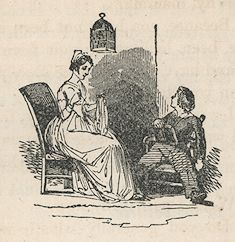
CHAPTER XXXII.
ATTENTION.
To enforce the necessity of practising attention, particularly in study, I offer to my readers the following dialogue between Charles and his mother:
Charles. Mamma, it is almost school-time?
Mother. No; you have full half an hour to spare.
C. Only half an hour! Will you hear me try to say this lesson again?
M. No; for I am sure you will say it no better than before.
-----
p. 161
C. Why, mamma?
M. Because you have not been studying. I have been looking at you from time to time, and have scarcely once seen your eyes fixed on your book.
C. I was only watching Jerry, for fear he should weed up my young balsams.
M. I fancy Jerry knows what he is about.
C. Well; I will study now.
M. Do you generally whistle when you study, Charles?
C. Was I whistling?
M. Yes, and with your eyes fixed on my canary bird.
C. Well, mamma, I cannot help it. This is the hardest and most stupid lesson that ever was.
M. And yet you told me your cousin Richard learned it, yesterday, in twenty minutes.
C. Then it is I that am stupid, I suppose.
M. I rather think not. I believe your memory is as good as Richard’s.
C. Oh, mamma! he always learns his lessons quicker than I do.
-----
p. 162
M. And does that prove that his memory is better?
C. To be sure it does.
M. When you are at play, does he remember things better than you do?
C. Why, no, I believe not.
M. Did not you tell us as much about the lecture the other night, when you came home, as he did?
C. Yes, and more too; papa said I did.
M. That required memory, certainly. I do not think you have any right to lay the blame on any natural defect.
C. Oh, I did not mean to say that! but all I know is that Richard gets his lessons quicker than I do; and what can the reason be? He is not three weeks older than I am, and does not seem more clever than I am about other things.
M. Did you ever happen to sit near him when he was studying?
C. Yes, I have; and I would rather sit next any boy in school.
M. Why?
C. Oh, I do not kinow! there is no comfort in it. He is as cross over his books as a dog
-----
p. 163
is with a bone: he will not let anybody speak to him.
M. What, not to ask a reasonable question?
C. Oh! as to that, he helps me sometimes, when I cannot get on; but what I mean is, if I ask him to look at anything funny, or want to talk to him about any of our plays for one minute, he says that I disturb him, and take off his attention.
M. He complains that you take off his attention, does he?
C. Yes, mamma.
M. Richard has learned a very important secret, I see.
C. A secret. What! one that helps him to get his lesson?
M. Yes.
C. I wish I could find it out.
M. I can tell it to you in one word which you used just now. It is as good as “Open Sésamé,” in the play of the Forty Thieves, which you read the other day.
C. What can it be?
M. Attention, Charles; attention! that will open the door of your mind and let the lesson in.
-----
p. 164
C. Oh dear! I wish calling the word out aloud would answer the purpose.
M. I cannot say that it will, so my comparison is not a perfect one; but I wished to fix your attention, and referred to something that had amused you. But, in good earnest, Charles, the only reason why Richard learns more quickly than you do is, that he never allows himself to think of anything else while he is engaged with his lesson. You speak of yourself as studying—as long as you are holding the book in your hand, though in fact you are not studying one quarter of the time.
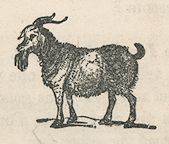
-----
[p. 165]
CHAPTER XXXIII.
VANITY.
The Kingfisher and Nightingale.
A meeting once took place between a kingfisher and a mocking-bird.* The latter, being dressed in very plain feathers, at first felt a little humbled by the brilliant plumage of his neighbour. The kingfisher, perceiving the admiration of the mocking-bird, jerked his tail and tossed his head, so as to show off all the changing hues of his feathers to great advantage.
While this was going on between the two birds, a sportsman chanced to be passing by, and seeing them, paused to watch their proceedings. Readily understanding the scene, and disgusted with the conceit and
*The mocking-bird is a famous American songster, and is perhaps equal in its song to the nightingale of Europe.
-----
p. 166
vanity of the kingfisher, he drew up his gun, and shot him. As he went to pick up the fallen bird, he made the following reflections:
“This silly kingfisher is like a person who is vain of his dress or his outward beauty. His skin, when stuffed with tow, is just as valuable as when the bird’s flesh and bones, and life, are in it; his outside is all there is of him. But the modest mocking-bird is like a person who contributes to our pleasure or our instruction, and relies upon the good he does to others for his standing among mankind. How contemptible is pride; how amiable and attractive is modesty united with merit!”
The Fox and Raven.
A raven was once sitting upon a tree with a nice bit of cheese in his mouth. A fox, being hungry, approached near to the raven with the design of getting the bit of cheese, if he could. So he began to speak as follows:
“Good morning, Mr. Raven! How fine
-----
p. 167
you look to-day! I never saw your coat so rich and glossy before. Pray give me a bit of that cheese; I am very fond of cheese.[”]
“Hem!” said the raven, taking care not to open his mouth, and seeming to think that he was not such a ninny as to be flattered out of his cheese by a fox. But reynard is a sort of natural lawyer, who knows the weak points of people, and has a faculty, as well as a disposition, to turn them to account. He thought to himself, “Now the raven has a hoarse, croaking voice, and the way to flatter any one is to praise that in which he is most deficient;” so he began:
“Well, my dear raven, I told you I wanted the cheese; but, in point of fact, I care little about it. I hate cheese, for it spoils the breath; but I really wanted to hear you sing, and the cheese stops up your mouth. I beg of you to sing me a little French or Italian air; you execute those things so deliciously.”
The raven, like some silly people who have odious voices, fancied that he sang
-----
p. 168
divinely; so he dropped the cheese and began: whereupon the fox picked up the cheese, and holding his sides for laughter, ran away, saying, “Flattery, oh flattery, thou art the key that unlocks all vain hearts! we have only to use the right kind, and we can enter where we please: let him, therefore, who would cheat, or rob, or steal, use flattery, and he will seldom fail of his object!”
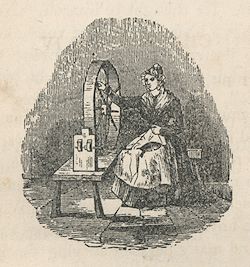
-----
[p. 169]
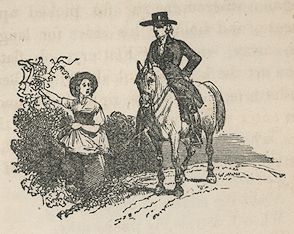
CHAPTER XXXIV.
DO NOT BE DISCOURAGED BY DIFFICULTIES.
We must not expect always to go smoothly forward in life, without opposition, reproach, or suffering; if we do, we shall be almost sure to meet with disappointment, and to be depressed by discouragement. Wherever there is anything worth possessing, there we shall find many persons striving for it, and in the competition we shall of course meet with difficulties. This truth is beautifully told in the following little poem written by
-----
p. 170
an English clergyman who lives in America, and entitled, “Briars and Berries.” the moral of the tale is, that where there is anything good, there we shall find a mixture of evil; that even the rose is allied to the thorn; that “briars will be where berries grow.”
’T was on a cloudy, gloomy day,
(If rightly I the date remember—
For certainly I cannot say,)
About the middle of September,
When I, astride my pacing gray,
Was plodding on my weary way,
To spend the night and preach the word
To people who had scarcely heard
The gospel; or, to say the least,
Had never viewed it as a feast
Of fat things full of marrow.
In sadness as I rode along
And crossed the silver Uuadilla,
The robin sang a plaintive song,
And faintly dropped the fading lily;
The smoky sky, no longer blue,
Assumed a dim and dusky gray;
And autumn, o’er my feelings threw
The colouring of its own decay,
And filled my heart with sorrow.
-----
p. 171
I, in my mind, was pondering o’er
The miseries that beset the preacher;
The persecutions which he bore—
(The scoff and scorn of every creature;)
His heated brain—his frame worn down,
Emaciated and dyspeptic,—
The hardened bigot’s frown;
The jeers and satire of the sceptic—
One mocking revelation’s page—
The other ridiculing reason;
And then the storms we must engage,
And all th’ inclemencies of season.
In this desponding, gloomy mood,
I rode perhaps a mile or two—
When lo! beside the way there stood
A little girl, with eyes of blue,
Light hair, and cheeks as red as cherries;
And through the briars, with much ado,
She wrought her way to pick the berries.
Quoth I, “My little girl, it seems
To me, you buy your berries dear;
For down your hand the red blood streams,
And down your cheek there rolls a tear.”
“O, yes,” said she, “but then, you know,
There will be briars where berries grow.”
-----
p. 172
These words came home with keen rebuke
To me, who mourned life’s little jostles,
And called to mind the things that Luke
Has written of the first apostles,
Who faced the foe without a fear,
And counted even life not dear.
And since, from that good hour to this,
Come pleasant or come stormy weather,
I still reflect that human bliss
And human woe are mixed together:
Come smiling friend or frowning foe—
“There will be briars where berries grow.”
